#she is the driving force behind the narrative! but also she never existed within it in the first place!
Explore tagged Tumblr posts
Text
she haunts the narrative. to me
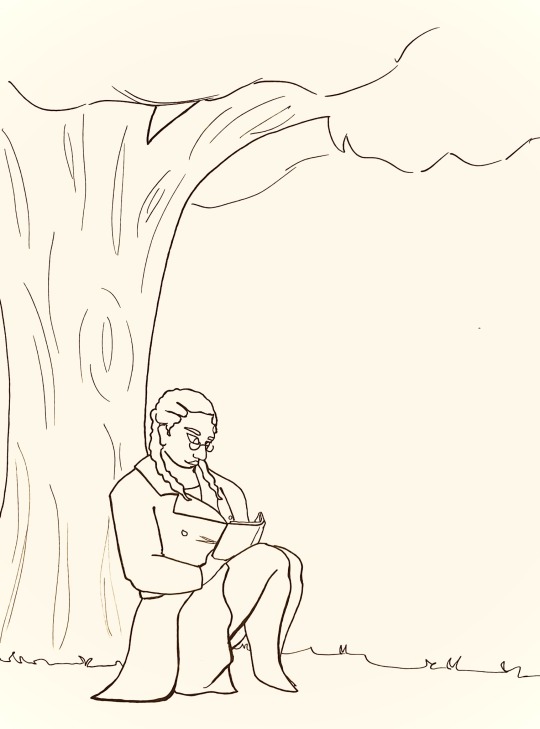
[ID: Pen-on-paper lineart of Penelope from Ulysses Dies at Dawn. Penelope is a thin Black woman in her 30s or 40s. she wears small, round glasses and her hair is in thick, loose braids with two pigtails draped over her shoulders. she sits on the grass and leans against the trunk of a large oak tree. she is relaxed and reading a book. penelope is wearing a trenchcoat and a skirt that ends just above her knees. she is barefoot. she smiles softly as she studies the book. End ID]
ough for real tho i need more people to talk about penelope bc she is just so crunchy. interesting
#she is the driving force behind the narrative! but also she never existed within it in the first place!#she drove the lives of everyone in the story whether they knew it or not but she was dead the whole time!#we know nothing about her except that#she was ulysses’ wife#she died#and she was never in the acheron#and that’s so much! that is so much to happen to someone! but we don’t even know who she was!#anyways#the mechanisms#my art#the mouse squeaks#ulysses dies at dawn#udad#penelope udad#fanart#the mechanisms fanart#ulysses dies at dawn fanart
37 notes
·
View notes
Text
Blurred Lines: Agency and Victimhood in Gothic Horror
Seeing as Robert Eggers' Nosferatu has just breached a cool $135M at the worldwide box office, it might be as good a time to talk about this as any. I believe I echo the sentiments of most diehard fans of gothic horror when I say this: while we are glad to see this masterpiece meet with well-deserved success, these numbers also mean that a significant proportion of its audience has been previously unfamiliar with the hallmarks of our beloved genre; and the resulting disconnect between the viewers and the source material has been the driving force behind the great majority of the online discourse that surrounds it.
The tools and conventions of the gothic, as a genre, are essential to Nosferatu's primary narrative arc. Its central character, Ellen Hutter, cannot be discussed outside of her literary context. Textually, she balances between heroine and damsel in distress - blurred, in many ways, from mainstream understanding.
That is done entirely on purpose. There are numerous reasons for it; I could go into heavy detail about it; and I will - under the cut, of course.
The main thing I must make absolutely clear (before delving any deeper) is that the gothic genre is fundamentally non-literal. It deals heavily in metaphor, allegory, allusion, obfuscation - and, indeed, the blurred lines that have recently caused so much controversy online. This is by design. It is not a flaw of storytelling or interpretation. The gothic affronts the rigid, black-and-white, mainstream forms of morality because that is what it has always been designed to do; and the newer installments like Nosferatu do the same, being built upon those traditional foundations.
The historical background is therefore essential to the understanding of a gothic narrative. In this, the film does provide the viewer with a relatively easy starting point; its period setting amplifies its connection to its predecessors, as well as the societal pressures and systemic violence that it aims to challenge. It allows the audience to perceive the story through a historical lens that comes pre-installed, as a sort of short-cut to the genre's original social context.
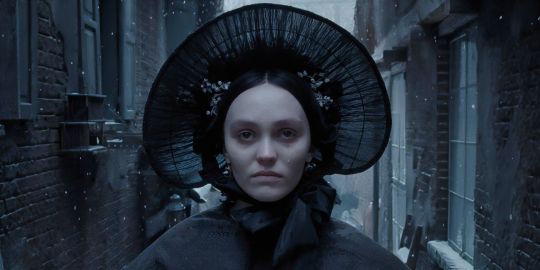
The context, in this case, consists of misogyny, queerphobia, xenophobia, and ableism - which, while rampant even in the modern day, were that much more blatant in 1830s German Confederation, where/when the story largely takes place. Every human character, regardless of who they are, is influenced by these oppressive aspects of their society; and Ellen Hutter is hopelessly entrapped within all four.
Her social situation, as we are given to understand, is precarious. Though she was originally born into wealth, she married down to escape her abusive father. She is an eccentric - her "wild" inclinations (such as having a sense of dignity or loving the outdoors as a child) are enough to cause almost vitriolic disapproval; but on top of that, she was born with a psychic gift, which manifests in a way that is not dissimilar from a mental (and sometimes physical) disability. She and her husband are also English immigrants, and thus perpetual outsiders in Wisborg (this is also one of the reasons Thomas is so anxious to prove himself at Knock's firm, and so keen to emulate Harding in all things); and, finally, she implied to experience queer attraction - which, though non-explicit, repressed, and never truly indulged, still affects her and the way she is continuously treated throughout the film.
Overall, Ellen's existence is perceived, at best, as an inconvenience - and at worst, a scandal. With that, she fits seamlessly into her story's genre.
The "immoral," the forbidden, the taboo is a cornerstone of all gothic fiction. It exists in the doubt between light and dark, harm and desire, love and abuse. It is the domain of sympathetic villains (e.g. Heathcliff, Wuthering Heights), of imperfect victims (Bertha Mason, Jane Eyre), of heroes who are deeply flawed, who cause their own tragedies, and often fail to save anyone at all (Victor Frankenstein, Frankenstein). Within the gothic genre, there are no absolutes; and its contradicting balance of dichotomies provides a reference point - or, more accurately, a cultural triangulation - for exploring the same complexities that a binary puritanical mindset strives to eradicate. These include sexual desire, female autonomy, physical and mental disabilities, classism; in short, anything that gets people wincing.
The popular discussion of these topics is frequently cruel, often avoidant, and rarely straightforward or productive. As stated above, it makes people uncomfortable. It's not pleasant. However, for Ellen (and many people in the real world), it is, quite literally, impossible to avoid. It defines every aspect of her daily life.
What this means for her and for the story is that within a narrative that refuses to gloss over the imperfections of her surrounding society, her victimhood is not thrust upon her by a shadowy figure, emerging from the night. Instead, she is a victim - of an ongoing and systemic, rather than individual, abuse.
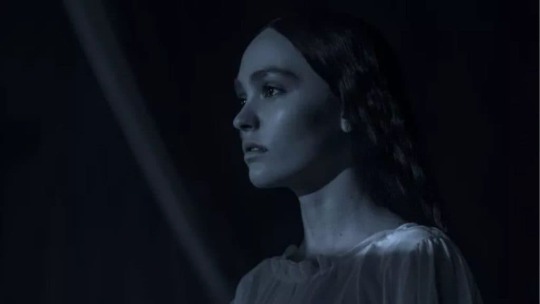
This aspect of Ellen's characterization lies at the core of her behaviour throughout the film. She is an unstable chimera of Brontë's Jane Eyre and Bertha Mason - in the sense that her actions are informed, in great part, by her acute awareness of her own disenfranchisement. She alternates between anguished raving and phlegmatic practicality, used to her pain but unable to entirely ignore it; and, the same way that Jane sees all the rage she feels (but cannot afford to express) manifested in Bertha, Ellen finds her counterpart in Orlok.
This is where the ambiguity begins.
Even though Orlok is most certainly a gothic villain, his relationship with Ellen cannot be interpreted as strictly adversarial. Naturally, it would be easy to ascribe their dynamic to grooming and PTSD; however, as previously mentioned, a gothic narrative is never surface-level - and the film itself never furnishes any information that would definitively limit it to that.
Firstly, to get the primary discourse point out of the way - yes, when Ellen and Orlok first meet within the ether, she is indeed young; and later, she is said to have been a child. However, at the time, the term "teenager"did not yet exist; Ellen's younger self is not portrayed by a child actress; and later, in 1838, she is referred to as a child multiple times - despite being an adult, married woman. Overall, within the film, the term is more often used to describe innocence and inexperience, rather than age; and her initial age is never specified. Granted, a multi-century age gap is not exactly "healthy" anyway - but this is a vampire story. It is per the course; and it complicates their relationship beyond a simple victim vs abuser narrative.
Secondly - and perhaps, most importantly - the overall impact of Orlok's coercion tactics falls flat in comparison to Ellen's human-world alternatives. Yes, he argues and threatens; but her social circumstances have never allowed her agency in the first place. Her father abuses, isolates, and threatens to institutionalize her; Thomas dismisses her concerns as "childish fantasies"; Harding and Sievers tie her down and drug her; Harding again kicks her out of the house. Her marriage, her friendships, are therefore all transactional; they grant her an escape from her father's house, relative financial stability, social support - on the condition that she represses her true self, pretends to be normal, doesn't threaten anyone's masculinity or heterosexuality, and acts like she's happy to be a deferring, obedient, settled wife. Being a daughter of a landed gentleman, she would never have been given a working woman's education, and evidently has no income of her own; and so, she has no options except to upkeep her end of the bargain - which means that her continued survival within mainstream society relies on constant background coercion.
Compared to this mundane, socially acceptable horror of her existence, the vampire actually offers her more autonomy than she is ever otherwise accorded. The terms of his covenant never threaten Ellen's own well-being; so on one hand, she has benevolence - and on the other, the dignity of choice.
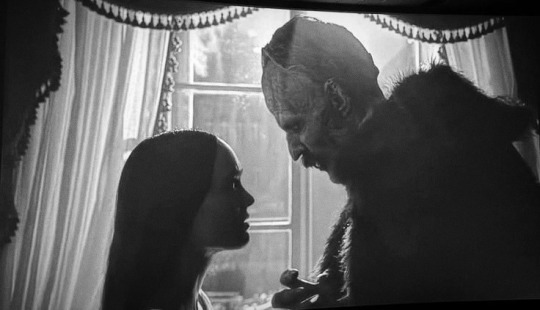
This contrast lies at the heart of her dilemma. Ellen is torn between what she believes she should be and what she knows - and Orlok knows - she is.
One is "correct," moral, Good; the other is "wrong," sinful, Evil. However, at the same time, the first is manufactured; it is artificially designed, and must be continuously enforced. The second is primal. Natural. In accordance with gothic tradition, the appeal of Orlok is that he is forbidden, yet instinctive. By design, he is a reflection of everything that Ellen is forced to repress on a daily basis. That includes her rage, her ostracism, her abnormalities; but also, her desperate need to be respected, understood, and desired. He is both grotesque and alluring, both a lord and a beast, both cruel and reverent.
"He is my melancholy!.." cries Ellen.
"I am Heathcliff!" whispers Cathy.
Still, while Cathy and Heathcliff are primarily divided by class and racism, Orlok and Ellen are separated by moral considerations. In the explicit sense, Ellen cannot choose the Evil that Orlok represents. Within the surface narrative, she is obligated by her society, her morals, and the story to choose Good - in this case, by nobly sacrificing her individual expendable life to save her husband and a city full of people. Her primary storyline, like everything else, has already been decided for her.
For the Trekkies among us, this is Ellen's own Kobayashi Maru. A no-win scenario. As such, within the context of character analysis, her destination does not matter as much as the little things she does along the way; and it is no accident that, as the film progresses, the subtler, seemingly insignificant choices she makes within that framework just happen to bring her closer - and closer - to Orlok.
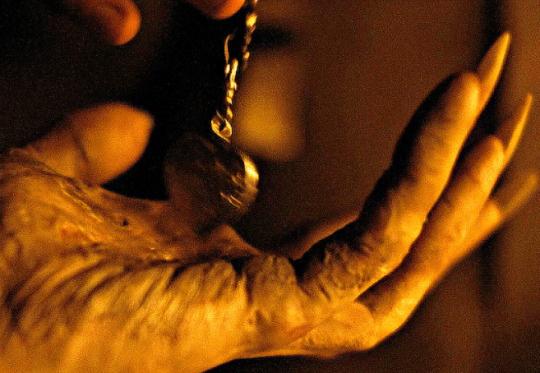
All of them are just innocuous enough to almost pass. She places a lock of perfumed hair in a locket that she gives to Thomas - and upon his arrival to the Carpathians, the same locket is immediately claimed by Orlok, who recognizes the scent of lilacs. Before making her sacrifice, she puts on her wedding dress and finds a bouquet of the same flowers - which is the sort of effort she didn't have to perform, especially given that he cannot resist her blood regardless. When Orlok arrives, she chooses to undress them both, and leads him to the bed, even though her previous sex scene with Thomas was entirely clothed; and in the morning, she pulls him close and holds him through the sunrise - even though he was already dying, and would not be able to escape. There was no need for her to touch his rotting flesh at that point, much less caress it.
There can be a "moral" explanation for all these actions; but the lack of direct obligation involved in them becomes increasingly blatant over the course of the story, and the doubt festers.
This sort of lingering ambiguity is precisely where gothic horror thrives - and intersects, scandalously, with romance. Gothic horror, much like bodice-ripper novels, noir thrillers, or "dark romance," builds much of its romantic intensity on the dichotomy of shame and desire. Imagine it, if you will, as a loom; warp and weft. It may even be described as literary BDSM - a continuous, mutually-agreed-upon act of roleplay between the author and their audience, and sometimes the characters themselves (though that depends). The point is to create an outlet for female, queer, or disabled sexualities, all of which are still heavily medicalized and restricted, derided, or denied entirely; and within these often intersecting genres, the violent or coercive intensity of the dominant lead (be it a vampire, a mafia don, or simply a more experienced lesbian) provides their repressed, seemingly passive counterpart an excuse to act upon their demonized erotic urges.
Between the page and the mind, everything that normally complicates a romantic or sexual encounter in the real world (subliminal hints, aggression, repressed and involuntary responses) becomes set dressing - serving to place a particular scene or dynamic within its fictional universe. The resulting Watsonian uncertainty is, naturally, part of the appeal. It is what allows the viewer/reader/listener a sincere emotional and sensual immersion; and for Ellen and Orlok, it provides an appropriately dramatic pretext for a night of tender vampire sex.
The discourse around their joining is painfully similar to the same that drifts around online every winter - in regards to the classic holiday hit, Baby it's Cold Outside. The song, written during an era in which extramarital sexuality was heavily restricted, follows a couple brainstorming excuses for the lady to stay the night; this intention was explicitly stated by both members of the original duet; but that hasn't stopped thousands of people from interpreting it as a "rape anthem." It is unsurprising, then, that an element of horror (guilt, shame, repression, coercion) muddles the water even further.
It's oddly apt, considering that the film premiered on Christmas Day.
Granted, I am not denying that there is an abusive aspect to Ellen and Orlok's connection, romantic or otherwise. However, to reduce Ellen to merely his "victim" is extremely inaccurate to her actual portrayal - because, within the framework of the film, her interactions with Orlok are the few in which she is actually able to exercise some form of agency. She never defers to him, their wedding-death hinges on her free will, as coerced as it may appear; and, in a fascinating subversion of a popular vampire trope, she is the one who summons him.
In gothic media, "Come to me!.." is invariably spoken by a vampire (or a vampire derivative like Erik, Leroux's titular Phantom of the Opera); their counterpart follows helplessly, without question; and giving these lines to Ellen is a dramatic deviation from tradition that fundamentally alters the underlying context of their power balance. By maintaining this call-and-response dynamic throughout the story, Eggers asserts that Ellen isn't helpless; and neither is she "in over her head." She is intelligent, powerful, and she has a tangible influence over Orlok, who is her only equal - which is why, ultimately, she is the one deciding where that relationship is headed.
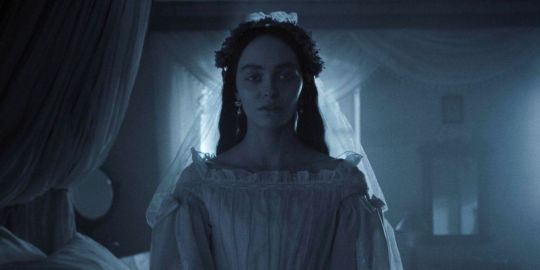
That is not to say that any alternative readings of the film are entirely incorrect. As I have stated above, the abusive/toxic narrative is definitely present, and even essential, in gothic media. On the Doylist level, it is the equivalent of a whip, or a solid pair of cuffs - essentially, a divestment of responsibility; though, to continue the metaphor, not everyone shares the same kink - and those who do might not all enjoy it the same way, so there's definitely significant variation. What I am trying to say, however, is that each story does come with a central conflict; and Ellen Hutter's victimization - much like Jane Eyre's, like Thomasin's (The Witch, 2015) - is systemic.
She is ostracized, disrespected - infantilized if her oppressors are feeling benevolent, demonized when they are inconvenienced - and still expected to always prioritize her husband/friends/community by default, regardless of how she is treated by them. Her surrounding society, morality, religion, culture all insist upon the same; and this is why, despite knowing that she has done nothing wrong by following her nature, she carries an enormous amount of guilt in regards to those "unacceptable" aspects of herself. It is also the same reason why Orlok - the sensual, cruel, utterly devoted monster - is the answer to her lonely call; and the reason why everyone around her is so eager to see her as his victim, rather than a victim of anything they may have perpetrated themselves. Ellen's is a rich complexity, fed upon centuries' worth of gothic tradition, and she cannot be forced into a flat, genre-inappropriate simplification.
Like The Witch, like NBC Hannibal, like Interview With the Vampire before it - Nosferatu (2024) is a story of self-indulgence being so unfamiliar that it feels like a sin; or, like dying.
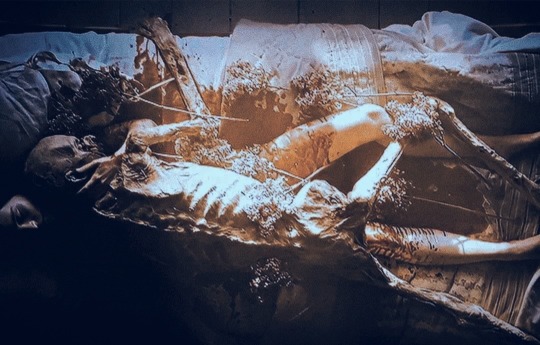
I, for one, would not deny her that.
#nosferatu#nosferatu 2024#nosferatu (2024)#ellen hutter#count orlok#lily rose depp#bill skarsgård#robert eggers#nosferatu movie#robert eggers nosferatu#nosferatu meta#ellenorlok#ellen x orlok#gothic fiction#gothic horror#gothic romance#horror film#horror film analysis#gothic art#wuthering heights#jane eyre#frankenstein#gothic film#vampire#vampires#vampire fiction#vampire movies
237 notes
·
View notes
Text
Because this is my blog and I cannot be stopped from rambling about writing, have a list of some fun facts and tidbits from working on Corruptive Shell, Rotten Core:
I'd been staunchly resisting writing a main games/portal stories mel crossover for ages with the excuse that even had I the energy to write it (I didn't), I had little plot in mind other than 'Chell and Mel hang out'. Then revolution dropped and ended on a cliffhanger on the moon, handing me not only an excuse to bring Wheatley back but also an excellent set-up for plot, and I could no longer resist.
The title Corruptive Shell, Rotten Core is, rather transparently, a reference to the facility itself being a corruptive force that rots everything within it, driving the plot that everyone must leave to have a chance at growing as people. It’s also, of course, a play on (personality) cores and Chell's name. Shockingly, I'm not known to be subtle.
I hadn’t played Aperture Tag when I started plotting, and thus the initial outline didn't feature Nameless or a co-opted Chell as antagonists. Instead, the planned antagonist was an alien AI that snuck in after Chell from the outside world and took over the facility. I scrapped this idea early on as it would require more extensive worldbuilding of the outside world, which I wanted to keep vague. I enjoyed the idea of the facility being a microcosm: once you're there, the outside world becomes irrelevant. Instead, Chell accidentally being teleported into Aegis' chamber and getting brainwashed was born.
Chell as an antagonist was a ploy to level the playing field between her, Glados and Wheatley. None of them can truly be forgiven, but if they’ve all at some point been drunk on power and attempted to kill the others, forgiveness becomes irrelevant. Also, I liked the symmetry of Chell+Wheatley fighting Glados, then Chell+Glados fighting Wheatley, and now Glados+Wheatley fighting Chell.
I played Aperture Tag after I'd already started writing, and immediately decided I needed to fit it into the narrative somehow. In the original outline, the story ended after Chell was convinced to leave with Glados, lacking a "true" antagonist. Personally, I think Nameless' addition made for a stronger and more explosive finale.
I very briefly played with the idea of making Chell and Nameless related/sisters, but discarded it as I felt it didn't fit the themes I was going with.
Nameless is supposed to mirror all the worst aspects of Chell, while also showcasing the damage Aperture has done and how the consequences of that might come back to bite them. While an antagonistic force, I view her more as a tragic figure of circumstance than as a villain.
Chell’s personality is based on several facts, among them 1: that she gets stabbed in the back multiple times and would be wary to trust as a result, and 2: word-of-god confirmation that she can talk, she just fucking hates all those robots.
Mel, meanwhile, is partly based on the fact that she was never betrayed and had a friend throughout, thus being much more open and trusting, and partly that I wanted someone very different from Chell to make their dynamic interesting.
I don’t know sign language. While I researched before writing and tried to be faithfull to it, I also took artistic liberties to make dialogue flow better. I hope it came off okay.
I adore Emilia, but part of what I wanted to portray with her is that she’s very much not only complicit but an active participant in Aperture's many crimes against humanity (I tried to do something similar with Virgil, which is highlighted in some of their conversations). I wanted to highlight her flaws, and how they very much exist despite being largely hidden behind her friendly and bubbly personality. She also lent herself well to explore the basics of machine sentience, as she’s both a creator of robots and an uploaded mind herself, thus seeing both sides of the issue.
Figuring out what I wanted Jane's personality to be like was a nightmare. For everyone else I had an idea of what they were like from the get go, but Jane was a big ?? in my mind. I spent ages on her introductory scene, eventually settling on 'how do you make a character that appears this late in the game not only quick to get in on the action, but also memorable? make her buckwild insane'.
Jane’s cyborg design is partially inspired by the concept art for the still-in-progress mod Portal Desolation!
While the humans are vastly different as people, I tried portraying them as all sharing the traits of 'good at rolling with the punches' and 'deeply pragmatic', as I could see no other way for them to survive the facility.
I often find portrayals of Chell and Glados in fic not to work for me. I can’t imagine Chell as soft or forgiving, or Glados (or Caroline) as victims rather than perpetrators of their own downfall. I wanted to really lean in to the messier aspects of both characters, and in what ways this messiness overlapped and drew them to each other, making them uniquely able to understand the other's perspective.
I knew from the very start that I wanted to end on Chell and Glados in the ruins of the outside world, neither fully human nor fully robot, and that the final lines would be Glados' aria playing as the facility shut down for good.
I love Virgil. Never have I encountered a character whose voice I have a harder time emulating.
I've never been very interested in humanoid glados designs (they're cool, but her canon design is so much more unique and interesting. also, I'm so sick of sexy lady robots, let her be inhuman), but I also knew I needed to get her out of the chassis for the latter half of the fic. Thus, portraying her in an android body while retaining her in-humaness became a balancing game.
I hadn’t played the half-life games when I started writing, and thus purposefully left the outside world vague as to leave open the possibility that they were still set in the same universe. By the time I reached the epilogue, I felt comfortable enough with half-life lore to include some explicit references. For the outside world, I imagine it being very solarpunk.
Originally, Chell and Glados didn’t discuss the Borealis in the epilogue but rather the Facility from Lightmatter, another puzzle game which while not officially part of the portal universe does include several references. I kinda regret not finding a way to include it, but as it was it no longer fit. Anyway, fun game, give it a go if you want a quick puzzle adventure with portal vibes!
#sometimes i must heed the inscrutable urges of my soul and write a flop post that no one but me will read#listen. i simply love talking about the writing process okay#I'm kind of fascinated with how much a story can change from initial outline#nella writes#corruptive shell#am i playing with the idea of making some art based on this fic? mayhaps#but first i gotta organize a neighbourhood meeting and also file my taxes. oh the woes of being an adult
4 notes
·
View notes
Text
It would take hours to actually articulate what happens in the penultimate chapter of my "Sheepdog" fanfic, but let me see if I can try.
A major thing Jimmy and Kim bond over is their shared interest as cinephiles. And I haven't seen many fans discuss this, but to me this suggests that both of them actually have a pretty terminal case of "main character" syndrome. They've both watched so many movies, that this is the only frame of reference for interpreting their reality, and this is the driving force behind why these two act like assholes. Jimmy is the more obvious example, given that so much of what he does during the various montages is needlessly convoluted in a way that only makes sense if you assume that amusing himself is his top priority. But I'd argue Kim does this too, just not with as much self-awareness.
Everyone within the narrative rightfully thinks this pair is unstable. But the delicious irony is that this insane view of the world is correct. And we know it's correct because we're watching these events unfold after all. And I just love the level of cosmic horror that this brings to the metanarrative: Wouldn't it be terrible if a narcissist's attitude that you were just a bit player in their story was justified? Wouldn't it be terrible if your free will was an illusion, because you were always created as a scapegoat to be sacrificed? Wouldn't it be horrifying if there was a God, but this god would be happy to reward terrible behavior as long as the violence was entertaining?
Now here's where this goes from regular headcanon to completely cracked:
In the final chapter of "Sheepdog", the fanbase of Breaking Bad is confirmed to be a malevolent supernatural force inflicting its collective will on the narrative. And specifically, Kim is confronted with the fact that she made a covenant with this entity at the end of Season 5 (securing her own longevity in the story by promising to harm others) and in Season 6 she tried to break this contract with the Devil. But it's too late to back out: Her destiny was to use the money she got from killing Howard to join the upper class, and hunt bigger, more dangerous game from there. We were promised a story of oligarchs meeting their demise. We were promised a story of a vengeful woman remaking the world in her own vision of perfect justice, and after having already taken two lives, she has no choice but complete the ritual by taking five more.
After mulling over her options, she accepts that the world as she knew it will come to an end unless she shoulders this burden of playing the villain. There are thousands of good, normal, people in the universe of Breaking Bad, people that she can't help but see as valuable human lives even after being told point-blank that these are just tertiary characters, but all those characters can only continue to exist so long as one person is fulfilling the titular goal of this franchise.
So when this character returns in "Slippin Kimmy" there is something decidedly OFF about her, even more than before, and the above is why. She doesn't remember the specifics of the lucid dream, but the intuition that she is a doll on a stage never leaves her. And even if Jimmy claims to understand, she knows he can't, not fully anyway. I remember once reading a think piece which described Anton Chigurh as "someone who doesn't even enjoy doing evil, but simply feels a grim obligation to serve as the hand of fate (. . .) the product of staring too long into the abyss of the modern age", and on some level I am going for a more toned-down version of that. Having seen the rest of her life laid out for her, Kim knows she has a lot left to look forward to which will make enduring all the horror worthwhile, but even if she's not happy in this role, it doesn't really matter. A humble existence just isn't in the cards for her.
This also would suggest that Iris is some sort of antichrist figure, but eh... it's even more complicated than that.
Also why yes, I am ripping off whole aspects of Dolores Abernathy's character arc! Thank you for noticing!
#kim wexler#slippin kimmy#mcwexler#meta fiction#bcs sheepdog#vampires#breaking bad#occultism#westworld#hail paimon#a24 films#wolves and sheep#I'M LIKE A GOD IN HUMAN CLOTHING#LIGHTNING BOLTS SHOOT FROM MY FINGERTIPS!!!!
5 notes
·
View notes
Text
Planets in the 8th House
Like all the watery houses, the 8th house is mysterious and potent, yet it’s difficult to fully get a grasp of. The area of life that this house represents are usually summarized by worn out key words; death, transformation, regeneration, rebirth, sex, shared finances, the occult, hidden complexes, power struggles, trauma, crisis and the list goes on… from these words one gathers that the 8th is not a light-hearted sphere of life – it signifies struggle and emotional intensity. Having planets in the 8th, strong Pluto or Scorpio influence usually revolves around the same themes – paranoia, the striving for control and a tendency to keep things private and buried in order to sustain power.
I’m not going to discuss the difference of having strong Scorpio-Pluto placements vs. having planets in the 8th house in this post, but since the sign, planet and house are linked and are symbolic of the same themes, there’s a lot of overlap that is to be expected.
A person with planet(s) in the 8th will not act out the planetary principles consciously. Usually, the energy is felt through their aura, quiet but evident, as if the planet makes its presence known without revealing itself. For example, someone with Venus in the 8th might not openly declare affection and love, except in the most intimate of settings, but it’s unquestionably there. Picture the goddess of love living within a person as a body of water. She is there, but she is slippery and unable to manifest through conscious expression in daily life. The reason for planets in the 8th house “hiding” usually has something to do with fear of losing control, of exposing something taboo and risky that could have dire consequences. We see this phenomenon in movies all the time – a person isn’t conscious of the fact the he or she is in love with a person but it’s obvious to everyone else – this would be typical of Venus in the 8th. One doesn’t dare to express it because it would alter the way of things, it would violate the sense of self-control and expose one’s vulnerability. Pain accompanies planets in the 8th, however benefic, because they impose themselves on the person and puts everything on the line. It’s a little bit like opening Pandora’s box – one can never go back to how things were before one fell in love, yet one resists the power with which one is pulled into a relationship. Even Venus and Jupiter, the most “positive” planets are operating in a way that makes the person feel out of control. Sure, it’s probably more positive to be invaded by love and abundance than anything else, but it can still be shocking and fearful to a person that doesn’t want to acknowledge the autonomy of the planet and has put up rigid defenses against it, only to have them be shattered. In the case of Venus in the 8th, personal love and affection is very private and usually has some kind of trauma or complex tied up with it. Looking at astrotheme’s database of people with Venus in the 8th , Miley Cyrus pops up at the top of the page with this placement. In some of her more personal songs, lyrics hint to her being afraid of love and intimacy. Even in her famous song “Wrecking Ball” she sings about falling under love’s spell and slowly seeing a relationship turn to “ashes on the ground”. If this isn’t typical symbolism of transformation through love I don’t know what is.
With the Moon in the 8th house, the person doesn’t openly express emotion – the emotions erupt volcanically from time to time, and it’s very uncomfortable for the person because there’s a feeling of being exposed and threatened that accompanies this release. Because of the fear that is tied up with emotion, the person might show dislike and defensiveness when faced with other people’s emotional expressions and needs. Sigmund Freud had his Moon in the 8th, which is very telling. He was obviously interested in uncovering the complexes behind certain reactions, presumably because he didn’t feel himself to be in control of his own emotions and inner life. He was certainly motivated to transform and free himself and his clients of the tight grip of the unconscious patterns of the 8th house. He explored the underlying mechanisms of repression, formulated the Oedipus complex and postulated the existence of libido – sexual energy with which the mental processes are invested. The Moon’s placement in the 8th would point to deeply rooted emotional and possibly sexual ties with the mother. The Oedipus complex is after all a desire for sexual involvement with the opposite sex and the presence of repressed incestuous instincts. Freud noted that he had wanted to marry his mother as a child to rival with the father and understood that it must be a universal principle among all boys in all cultures. This has not been thoroughly empirically proven, but it’s certainly reveals something about Freud’s own psychology. In any case with Moon in the 8th, the emotional and instinctual nature is accompanied with a sense of it being taboo and shameful. The emotional nature is experienced to be powerful beyond personal control.
Mercury in the 8th is a another story. Mercury is the planet of communication, thinking and deductive reasoning. When looking up people with this placement, it seems to me that it is common among people who speak up about uncomfortable topics, that which would be considered “risky business” to talk about. Prince Harry has this placement and he has been very open recently about his mental health struggles. Emma Watson has this placement and she has been an advocate for feminism and equality – preaching and advocating strongly with emotional investment when giving the famous UN speech in 2014. Lana Del Rey has this placement and she writes lyrics based on her own personal experiences, not shying away from dark topics like death, heartbreak, destructive and passionate relationships. It seems as if Mercury in this house gives the person a propensity for talking and thinking about that which in uncomfortable, for revealing difficult power-imbalances and dynamics taking place within the psyche. There’s usually a feeling of being cautious of what one reveals, of sitting on information that holds emotional power and that involves other people. With any planet in this house there’s a strong impulse to be aware of other people, in case of Mercury it’s what other people know and don’t know, what they say and don’t say. Mercury in the 8th might be indicative of a person who is controlled by what other people say and feels at the mercy of other people’s opinions – positively and negatively. The narratives and stories of other people might merge with the person on a deep level and fuel one’s own opinions. One might be exposed to challenging, discriminative and harmful opinions, even indoctrinated in them. When speaking one’s mind, one might have to summon a lot of bravery because more than likely there’s a bit of a chokehold that is being felt and effort that is required to break free from deeply instilled thought patterns. This placement could be indicative of a person that likes to think and communicate about deep and taboo topics, reveal and keep secrets.
With Mars in the 8th, one simple interpretation would be “someone who is prone to experience physical violence in intimate relationships”. Either one is the victim of it or the perpetrator, perhaps even a bystander or a protector. The violence, albeit linked to physical action, might just manifest in the form of acting without another’s best interest in mind. There’s usually a sense of being at the mercy of other people’s actions with this placement, but also of having no conscious control over one’s own motivations for doing things, one’s own drive to make things happen. Princess Diana had this placement, conjunct Pluto-Uranus, and she was far from feeling in absolute control of her direction in life. With Pluto-Mars the drive is buried and tied up with the primal survival instinct and latent rage. Her relationship with Prince Charles was anything but smooth and she felt like a victim to greater forces (Pluto-Uranus) making her act in a way that was, most certainly, driven by emotional complexes and not out of conscious will. She also behaved in a way with her compulsive eating and independent streak that was not favorably looked upon. J.F. Kennedy also had this placement, he too had difficulties on the relationship front, mostly because he had a compulsive sexual drive and had a lot of extramarital affairs. This is typical of Mars in the 8th being tied up with emotional complexes – he couldn’t stick to his wife; he had to prove himself and his masculinity through conquering women (he has Jupiter conjunct his Mars and we all know how faithful Jupiter was in mythology). His sexual appetite caused moral problems among the Secret Service agents who were employed to smuggle women in and out of the White House. His behavior was altogether inappropriate but somehow he survived politically as it was kept in the shadows. Diana certainly had her own extramarital affairs as well, perhaps to revenge Charles for his strong tie with Camilla and subsequent declining interest in their marriage. Mars in the 8th is undoubtedly indicative of action taken out of the need to retain emotional integrity, sometimes with unfavorable consequences. Notably, both Diana and J.F. Kennedy died suddenly, Diana in a car accident and J.F. Kennedy through assassination by a bullet. The 8th house is the house of death, and Mars here usually indicates a violent and sudden strike of “fate”.
Last but not least, let’s take a look at the Sun in the 8th house. The same people who shows up when searching for Mercury, Mars and even Venus, also have the Sun in this house; J.F. Kennedy, Lana Del Rey, Emma Watson and Prince Harry, which is not surprising considering that the inner planets never stray too far from the Sun. The Sun represents the ego, the sense of self-knowledge and self-awareness. The Sun is representative of the conscious center of the personality. This suggests that the people with this placement are painfully aware of death and violation, of the destructive nature of reality. While the Moon in the 8th might indicate that emotional reactions or lack thereof stem from deep seated autonomous complexes rooted in survival, the Sun might indicate a sense of self and self-expression that stems from the difficulties and hardships one has gone through. This placement can be understood in the sentiment “who am I without my trauma?”. There’s the tendency to identify with the ordeals of one’s life and how one overcame them (or didn’t). This dynamic is evident in all the people listed at the top of this paragraph. Prince Harry being a very obvious one that people make fun of nowadays – he’s coming out as a survivor of past down ancestral trauma, attempting to work through and shine a light on his personal struggles growing up within the Royal Family, attempting to separate himself from the curses of unconscious programming. Lana Del Rey certainly enjoys identifying and expressing the darker side of herself, illuminating the theme of death and emotional hardship in her songs. Emma Watson also seems to identify with the hurt and injustice present in the world and is a spokesperson for collective movements (Sun in the 8th, Leo in the 11th). J.F. Kennedy has the same Sun –Leo house setup as Emma, channeling his experience of personal hardships into his career and public life. In a sense, people who want to appeal to the masses and make a change on a large scale must be personally invested enough to fuel the movement. In the case of the 8th house being involved with Kennedy and Watson, they might feel as if their sense of self is dictated by other people’s values or that they would have to fight to remain in control of their sense of self. As the Sun relates to the father, the father figure might’ve been quite controlling, demanding and dominant. If the Moon in the 8thsays something about a mother complex, the Sun in the 8thdefinitely says something about a father complex.
#planets in the 8th house#mars in the 8th house#venus in the 8th house#mercury in the 8th house#astrology signs#8th house in astrology#moon in the 8th house#sun in the 8th house#personal planets#house placements#houses in astrology
562 notes
·
View notes
Note
thoughts on cuddy's ending?
Oh. My. God. Nonnie!!!!! *takes a deep breath*
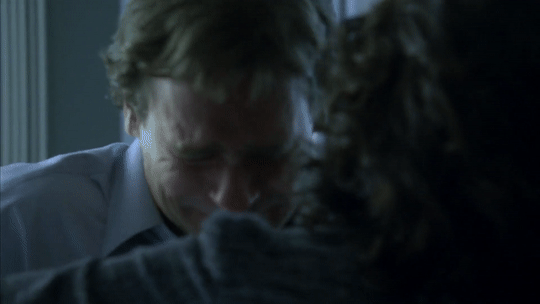
I HATED IT!!!!!!!! Cuddy as a character has always worked against the show's (*coughs* misogynistic) logic (not to mention House's logic), she's the driving force behind a vast majority of instances!!!!! The light, the heart of it all!!!! (no wonder the s8 filter is so dark djdjdjdjksk) After seven years of being a series regular, she deserved so much better. Hell, she deserved so much better while she was still a part of the show!!! Buuuuut, me being me, I had to figure out an in-universe explanation for *gestures vaguely* whatever that finale was and an explanation that satisfied me well enough (It's dark. I'm a fan of the imaginary friend!Wilson theory, ofc it's freaking dark), so here you go (read at your own risk):
Okay so, Cuddy's primary purpose at the beginning of the show is to be House's narrative foil, right? He rebels against authority -> she's authority personified. He's "the outlaw" and she's all about "the rules". But then there's s2 and by the end of it, they start to blend into one another for the first time (there are little tiny clues at the beginning of the season tho, like Cuddy's famous computer password, that imply that she might not be your classic uptight overachieving boss lady WHICH I ADORE ABOUT HER #cuddyfanclub4everrrr)... or better yet they (just as the audience) start noticing the similarities that have always been there, but weren't acknowledged. One giant parallel that was developed with time has to do with the way their bodies betrayed both of them (which will later happen to Wilson as well :/) and it's maddeningly interesting. But it also positions Cuddy as the heart of the show for the first time because House finds her ways of dealing with her situation admirable. Ridiculous! But admirable. (not to say that chronic pain equals infertility, but you get what I mean) Which is kind of like his whole perception of her, almost like she shouldn't even exist, Cuddy is that contrasted with the world from House's perspective. This is why he mocks her, he's trying to find the "real" truth within her, because she just can't be carrying her truth for everyone to see like she does (can be applied to Wilson too, tho Wilson is, if you ask me, more intertwined with House's identity than Cuddy is, I feel like House views Wilson as the best part of himself and Cuddy as someone whose existence symbolises something larger and brighter than who he is), she must somehow be as awful as everyone else is, horrible like he is. (what he doesn't get here is that he's the only person who gets to see that truth so easily and it's not a decision Cuddy has made consciously, it's a decision she didn't even know she was making) BUT!!!!! She proves him wrong (almost) every time. Because Cuddy genuinely is caring and kind and patient and loving. And when s7 comes to an end, Cuddy has done what House would have done if he was in her shoes. She broke up with him and that decision brought her closer to the part of House that House hates, closer to everyone else. What House does in the s7 finale is the ultimate act of self-hatred, you know? It's terrifyingly twisted and more insane than perhaps anything he's ever done. He's crashing into Cuddy's house, but his aim is to destroy himself. And scare Cuddy away, scare her so much that she never comes back. I think House needs that knowledge of a certain light or hope being out there, just a proof of its existence, even if it doesn't directly affect him at that point and I don't think he realizes he needs that kind of assurance, not before he loses Cuddy completely. Because that's when he starts to worry that he might have changed her, not necessarily for the worse, but made her a little more like the rest of the world (which is such a faulty assumption, but that's House for ya), a thought planted by Cameron back in s6.
#i have... complicated feelings about house's character downgrade in s7. sometimes i'm like... happy doesn't mean boring writers!!!!#and sometimes i'm like... negative development is a valid thing too#house m.d.#lisa cuddy#meta#💌restless wind inside a letter box💌#lisa cuddy is my favourite superhero#that's my best friend lisa cuddy is my best friend
33 notes
·
View notes
Note
HS2's themes are fuckin wack crap cuz like... idk it all starts with the epilogues, right? the thing that the epilogues are trying to say is that all conflict that the characters face within the narrative is there because the audience cast their gaze upon this story and demanded entertainment. something has to happen on the stage to keep us watching, thus, it is the audience's fault that the characters suffer. but that's bullshit for so many reasons. for one thing, it ignores the role of the author. audience demand doesn't force an author's hands to write... that's a decision that the author made. we could've lived with nothing at all.
and conflict comes in many flavors. some stories hardly have any conflict at all. the whole iyashikei genre exists, like, I think we're well past understanding that cynicism, tragedy, and destruction are not the only forces that can drive a narrative. "conflict" is not the only reason for a story to be told. once again, stories tell us as much about the author as their audience. the kind of story an author deems worthy of telling is just as relevant to consider as the kind of story an audience deems worthy of attention.
and even in conflict driven stories... it matters what the conflict is, who wins, how, and why. as a simple example, when the conflict is a battle between good and evil, good wins, it does so by way of the power of friendship, and the reason it is presented this way is to promote the idea that you should be kind and help others... that's a story with a purpose. obviously this is like, children's cartoon level simple, and a story can be written to say different or more complex things, but I should always be able to ask those questions and come up with an answer.
if, as an author, Hussie wanted to accuse his audience of being culpable in the suffering of his characters, he would at least have to present the reader with a meaningful choice. and at first glance, it would almost seem like he did. meat and candy, even by their naming convention, seem as though they are giving you the option to consume a light or dark tale. but even in the names, there is a seed of judgement. Hussie has described the concept of a narrative containing both "meat" and "candy" in terms of story content, wherein meat is anything heavy in terms of plot or drama, and candy is anything that provides levity as a counterbalance, such as jokes or feel good fluff. these categories are already identified as "substance" vs. "a lack of substance" which places value on the cynical, dark route as being more truthful... conflating cynicism with realism.
and already I can see making a case for the idea that neither route is legitimate, because no story should subsist on just one or the other... both need to be at play for the story to be balanced. and you could even argue that the lampooning of the epilogues' legitimacy was the point... that they were supposed to be outside of canon and regarded as illegitimate all along. but then not only does that negate the author's ability to let the audience choose the kind of story they're participating in, but the story itself doesn't play by its own rules.
does candy truly read like some fluffy pandering fanservice filler, the way one might expect it to? and is meat totally devoid of any levity, while focusing only on plot machinations and/or the characters' dramatic downward spiral? I would argue that, even though the consensus seems to be that both routes are equally dismal, neither even gets dark enough to live up to that end of the bargain either. the execution is messy... the concept doesn't hold up.
and what of the initial concept? that the audience's observation of a story forces the characters to enact a conflict for the sake of our entertainment? is that really what's going on here? from the initial pitch, you could already tell that the answer was no. nobody asked for this. and so we cast our apparently destructive audience gaze onto Homestuck 2.
but there, we find another curveball. the story is... almost becoming self aware? in that it casts a character in the role of the author, and also identifies him firmly as the villain. but see, this is still a blame shift. and maybe that would've been less obvious if Andrew Hussie had not introduced himself as a character inside of his own web comic throughout the original narrative. the true author is already here.
the villain of homestuck was never the audience, and it was never a fictional character. if we're really shattering the 4th wall... if we're really ceasing our suspension of disbelief, pulling back the curtain, and acknowledging that these characters are fabricated, manipulated entities with real people behind the wheel, then there is only one conclusion we can possibly come to. the author has control over the narrative... no one else. and the things the author chooses to say with the platform they've made for themselves? those things are on them. what are we to understand about the author, as his audience?
this is why people are looking past the story entirely and engaging with the creative team, for better or for worse. if you break your story enough, it won't work anymore. and when the audience finds it in shambles, completely unusable as a story... you know, the thing it was intended to be? they might actually look to the people who broke it and ask them why they did that. it was a nice story. it performed several functions that people actually enjoyed. was dismantling it like this really the most fulfilling thing they could've done with it?
and I'll tell you another thing. part of why people take it so personally is because, just like how Andrew Hussie, the homestuck character, was a stand-in for Andrew Hussie, the human being... many of the characters in homestuck were stand-ins for us. John Egbert was for people who had an obsessive nerdy interest in movies, Rose was for people who wrote fanfiction, Nepeta was for people who ship characters a lot, she and Terezi were for people who RP, and also... Dave was for people who were trying to act cooler than they felt, Jade was for people who were lonely, Kanaya was for people who wanted to help people and be accepted, Vriska was for people who were hard to love and felt judged for that.
who do these writers think they're messing with?
and I just want to make it clear that I'm not condoning any kind of harassment of them, or anything like that. ultimately, my point here is that we are not our effigies. and in the same way that an author can't blame shift onto a fictional character, a person cannot claim the direction of a fictional story as a reason to do real harm.
but homestuck was always unique in that it spoke very directly to its audience. when Hussie added real pieces of us to his fake people, he had a powerful vehicle for the messages that he wanted us to hear. lots of stories have characters that are written to be relatable, but you'd be hard pressed to find ones that feel quite so specific as the cast of homestuck. to our era. to our humor. to the values of people growing up in our online cultural circumstances.
if this specific author is going to choose to act like a villain, at least in the small-scale context of this comic, then what is that setting us up to be? maybe nothing so presumptuous as a hero... maybe just like, Dave of Guy, y'know? but Dave made normal a pretty heroic thing to be... I think it's up to us to just be normal and have normal fun, in spite of the shit show. regular old homestuck already said all the valuable stuff it was gonna. for my part, I'm just gonna take that and run off with it. ignoring HS2 doesn't make it go away, but paying attention to it doesn't make it good either... so I guess whatever.
that's the themes. the themes are just a big "so what" shrug. most complicated way to say "who cares" I've ever seen.
This is a really good analysis
72 notes
·
View notes
Photo
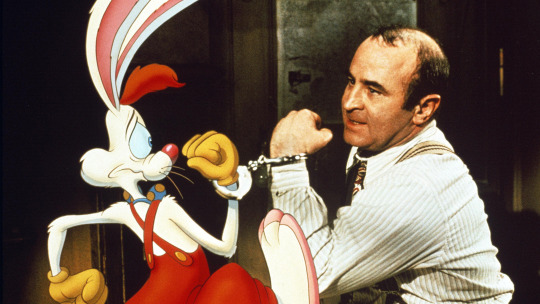
Blurring the Line.
As a new Space Jam film beams down to Earth, Kambole Campbell argues that a commitment to silliness and a sincere love for the medium is what it takes to make a great live-action/animation hybrid.
The live-action and animation hybrid movie is something of a dicey prospect. It’s tricky to create believable interaction between what’s real and what’s drawn, puppeteered or rendered—and blending the live and the animated has so far resulted in wild swings in quality. It is a highly specific and technically demanding niche, one with only a select few major hits, though plenty of cult oddities. So what makes a good live-action/animation hybrid?
To borrow words from Hayao Miyazaki, “live action is becoming part of that whole soup called animation”. Characters distinct from the humans they interact with, but rendered as though they were real creatures (or ghosts), are everywhere lately; in Paddington, in Scooby Doo, in David Lowery’s (wonderful) update of Pete’s Dragon.
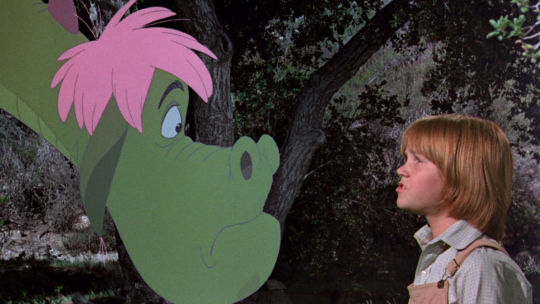
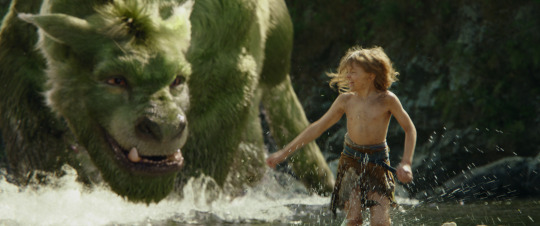
The original ‘Pete’s Dragon’ (1977) alongside the 2016 remake.
Lowery’s dragon is realized with highly realistic lighting and visual-effects work. By comparison, the cartoon-like characters in the 1977 Pete’s Dragon—along with other films listed in Louise’s handy compendium of Disney’s live-action animation—are far more exaggerated. That said, there’s still the occasional holdout for the classical version of these crossovers: this year’s Tom and Jerry replicating the look of 2D through 3D/CGI animation, specifically harkens back to the shorts of the 1940s and ’50s.
One type of live-action/animation hybrid focuses on seamless immersion, the other is interested in exploring the seams themselves. Elf (2003) uses the aberration of stop-motion animals to represent the eponymous character as a fish out of water. Ninjababy, a Letterboxd favorite from this year’s SXSW Festival, employs an animated doodle as a representation of the protagonist’s state of mind while she processes her unplanned pregnancy.
Meanwhile, every Muppets film ever literally tears at the seams until we’re in stitches, but, for the sake of simplicity, puppets are not invited to this particular party. What we are concerned with here is the overlap between hand-drawn animation and live-action scenes (with honorable mentions of equally valid stop-motion work), and the ways in which these hybrids have moved from whimsical confections to nod-and-wink blockbusters across a century of cinema.
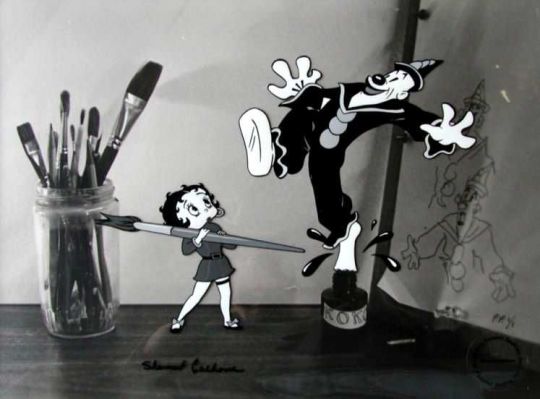
Betty Boop and Koko the clown in a 1938 instalment of the Fleischer brothers’ ‘Out of the Inkwell’ series.
Early crossovers often involve animators playing with their characters, in scenarios such as the inventive Out of the Inkwell series of shorts from Rotoscope inventor Max Fleischer and his director brother Dave. Things get even more interactive mid-century, when Gene Kelly holds hands with Jerry Mouse in Anchors Aweigh.
The 1960s and ’70s deliver ever more delightful family fare involving human actors entering cartoon worlds, notably in the Robert Stevenson-directed Mary Poppins and Bedknobs and Broomsticks, and Chuck Jones’ puntastic The Phantom Tollbooth.
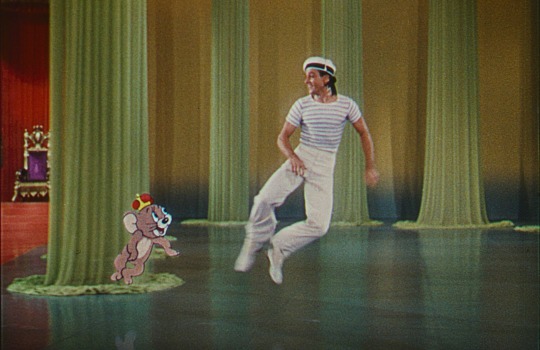
Jerry and Gene dance off their worries in ‘Anchors Aweigh’ (1945).
Mary Poppins is one of the highest-rated live-action/animation hybrids on Letterboxd for good reason. Its sense of control in how it engages with its animated creations makes it—still!—an incredibly engaging watch. It is simply far less evil than the singin’, dancin’ glorification of slavery in Disney’s Song of the South (1946), and far more engaging than Victory Through Air Power (1943), a war-propaganda film about the benefits of long-range bombing in the fight against Hitler. The studio’s The Reluctant Dragon (1941) also serves a propagandistic function, as a behind-the-scenes studio tour made when the studio’s animators were striking.
By comparison, Mary Poppins’ excursions into the painted world—replicated in Rob Marshall’s belated, underrated 2018 sequel, Mary Poppins Returns—are full of magical whimsicality. “Films have added the gimmick of making animation and live characters interact countless times, but paradoxically none as pristine-looking as this creation,” writes Edgar in this review. “This is a visual landmark, a watershed… the effect of making everything float magically, to the detail of when a drawing should appear in front or the back of [Dick] Van Dyke is a creation beyond my comprehension.” (For Van Dyke, who played dual roles as Bert and Mr Dawes Senior, the experience sparked a lifelong love of animation and visual effects.)
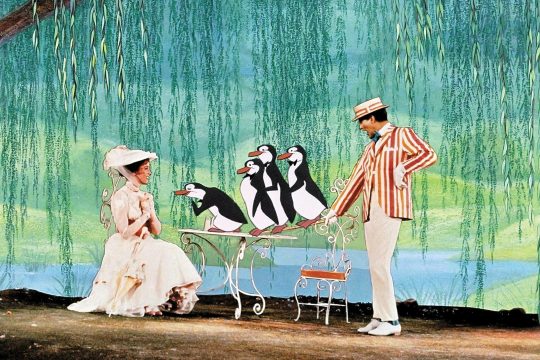
Julie Andrews, Dick Van Dyke and penguins, in ‘Mary Poppins’ (1964).
Generally speaking, and the Mary Poppins sequel aside, more contemporary efforts seek to subvert this feeling of harmony and control, instead embracing the chaos of two worlds colliding, the cartoons there to shock rather than sing. Henry Selick’s frequently nightmarish James and the Giant Peach (1996) leans into this crossover as something uncanny and macabre by combining live action with stop motion, as its young protagonist eats his way into another world, meeting mechanical sharks and man-eating rhinos. Sally Jane Black describes it as “riding the Burton-esque wave of mid-’90s mall goth trends and blending with the differently demonic Dahl story”.
Science-classroom staple Osmosis Jones (2001) finds that within the human body, the internal organs serve as cities full of drawn white-blood-cell cops. The late Stephen Hillenburg’s The Spongebob Squarepants Movie (2004) turns its real-life humans into living cartoons themselves, particularly in a bonkers sequence featuring David Hasselhoff basically turning into a speedboat.

David Hasselhoff picks up speed in ‘The Spongebob Squarepants Movie’ (2004).
The absurdity behind the collision of the drawn and the real is never better embodied than in another of our highest-rated live/animated hybrids. Released in 1988, Robert Zemeckis’ Who Framed Roger Rabbit shows off a deep understanding—narratively and aesthetically—of the material that it’s parodying, seeking out the impeccable craftsmanship of legends such as director of animation Richard Williams (1993’s The Thief and the Cobbler), and his close collaborator Roy Naisbitt. The forced perspectives of Naisbitt’s mind-bending layouts provide much of the rocket fuel driving the film’s madcap cartoon opening.
Distributed by Walt Disney Pictures, Roger Rabbit utilizes the Disney stable of characters as well as the Looney Tunes cast to harken back to America’s golden age of animation. It continues a familiar scenario where the ’toons themselves are autonomous actors (as also seen in Friz Freleng’s 1940 short You Ought to Be in Pictures, in which Daffy Duck convinces Porky Pig to try his acting luck in the big studios).
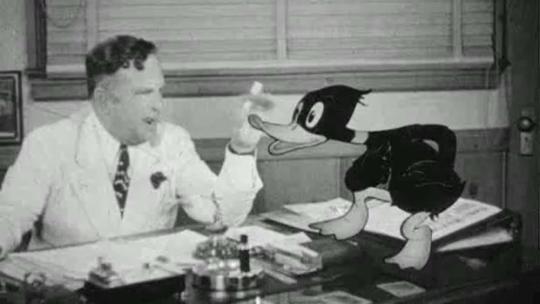
Daffy Duck plots his rise up the acting ranks in ‘You Ought to Be in Pictures’ (1940).
Through this conceit, Zemeckis is able to celebrate the craft of animation, while pastiching both Chinatown, the noir genre, and the mercenary nature of the film industry (“the best part is… they work for peanuts!” a studio exec says of the cast of Fantasia). As Eddie Valiant, Bob Hoskins’ skepticism and disdain towards “toons” is a giant parody of Disney’s more traditional approach to matching humans and drawings.
Adult audiences are catered for with plenty of euphemistic humor and in-jokes about the history of the medium. It’s both hilarious (“they… dropped a piano on him,” one character solemnly notes of his son) and just the beginning of Hollywood toying with feature-length stories in which people co-exist with cartoons, rather than dipping in and out of fantasy sequences. It’s not just about how the cartoons appear on the screen, but how the human world reacts to them, and Zemeckis gets a lot of mileage out of applying ’toon lunacy to our world.
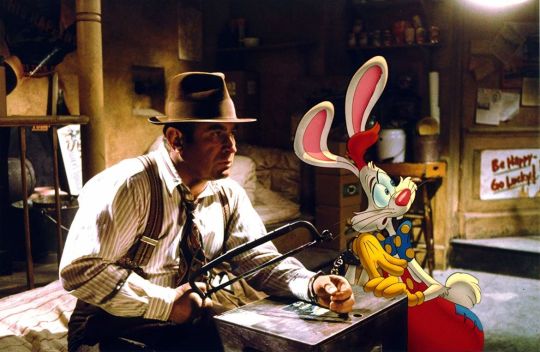
Bob Hoskins in ‘Who Framed Roger Rabbit?’ (1988).
The groundbreaking optical effects and compositing are excellent (and Hoskins’ amazing performance should also be credited for holding all of it together), but what makes Roger Rabbit such a hit is that sense of controlled chaos and a clever tonal weaving of violence and noirish seediness (“I’m not bad… I’m just drawn that way”) through the cartoony feel. And it is simply very, very funny.
It could be said that, with Roger Rabbit, Zemeckis unlocked the formula for how to modernize the live-action and animation hybrid, by leaning into a winking parody of what came before. It worked so perfectly well that it helped kickstart the ‘Disney renaissance' era of animation. Roger Rabbit has influenced every well-known live-action/animation hybrid produced since, proving that there is success and fun to be had by completely upending Mary Poppins-esque quirks. Even Disney’s delightful 2007 rom-com Enchanted makes comedy out of the idea of cartoons crossing that boundary.
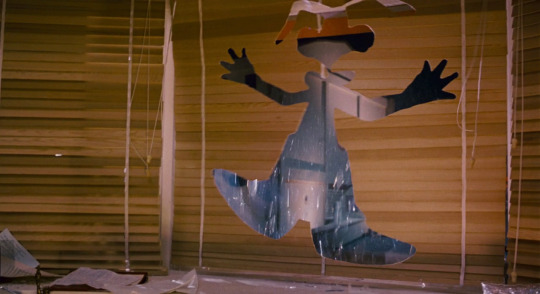
When a cartoon character meets real-world obstacles.
Even when done well, though, hybrids are not an automatic hit. Sitting at a 2.8-star average, Joe Dante’s stealthily great Looney Tunes: Back in Action (2003) is considered by the righteous to be the superior live-action/animated Looney Tunes hybrid, harkening back to the world of Chuck Jones and Frank Tashlin. SilentDawn states that the film deserves the nostalgic reverence reserved for Space Jam: “From gag to gag, set piece to set piece, Back in Action is utterly bonkers in its logic-free plotting and the constant manipulation of busy frames.”
With its Tinseltown parody, Back in Action pulls from the same bag of tricks as Roger Rabbit; here, the Looney Tunes characters are famous, self-entitled actors. Dante cranks the meta comedy up to eleven, opening the film with Matthew Lillard being accosted by Shaggy for his performance in the aforementioned Scooby Doo movie (and early on throwing in backhanded jokes about the practice of films like itself as one character yells, “I was brought in to leverage your synergy!”).
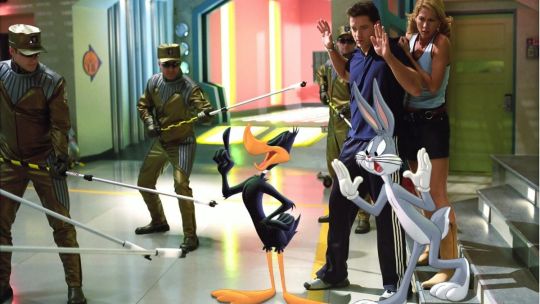
Daffy Duck with more non-stop banter in ‘Looney Tunes: Back in Action’ (2003).
Back in Action is even more technically complex than Roger Rabbit, seamlessly bringing Looney Tunes physics and visual language into the real world. Don’t forget that Dante had been here before, when he had Anthony banish Ethel into a cartoon-populated television show in his segment of Twilight Zone: The Movie. Another key to this seamlessness is star Brendan Fraser, at the height of his powers here as “Brendan Fraser’s stunt double”.
Like Hoskins before him, Fraser brings a wholehearted commitment to playing the fed-up straight man amidst cartoon zaniness. Fraser also brought that dedication to Henry Selick's Monkeybone (2001), a Roger Rabbit-inspired sex comedy that deploys a combo of stop-motion animation and live acting in a premise amusingly close to that of 1992’s Cool World (but more on that cult anomaly shortly). A commercial flop, Back in Action was the last cinematic outing for the Looney Tunes for some time.
Nowadays, when we think of live-action animation, it’s hard not to jump straight to an image of Michael Jordan’s arm stretching to do a half-court dunk to save the Looney Tunes from slavery. There’s not a lot that can be fully rationalized about the 1996 box-office smash, Space Jam. It is a bewildering cartoon advert for Michael Jordan’s baseball career, dreamed up off the back of his basketball retirement, while also mashing together different American icons. Never forget that the soundtrack—one that, according to Benjamin, “makes you have to throw ass”—includes a song with B-Real, Coolio, Method Man and LL Cool J.
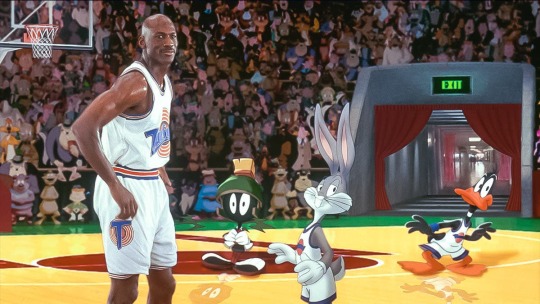
Michael Jordan and teammates in ‘Space Jam’ (1996).
Space Jam is a film inherently born to sell something, predicated on the existing success of a Nike commercial rather than any obvious passion for experimentation. But its pure strangeness, a growing nostalgia for the nineties, and meticulous compositing work from visual-effects supervisor Ed Jones and the film’s animation team (a number of whom also worked on both Roger Rabbit and Back in Action), have all kept it in the cultural memory.
The films is backwards, writes Jesse, in that it wants to distance itself from the very cartoons it leverages: “This really almost feels like a follow-up to Looney Tunes: Back in Action, rather than a predecessor, because it feels like someone watched the later movie, decided these Looney Tunes characters were a problem, and asked someone to make sure they were as secondary as possible.” That attempt to place all the agency in Jordan’s hands was a point of contention for Chuck Jones, the legendary Warner Bros cartoonist. He hated the film, stating that Bugs would never ask for help and would have dealt with the aliens in seven minutes.
Space Jam has its moments, however. Guy proclaims “there is nothing that Deadpool as a character will ever have to offer that isn’t done infinitely better by a good Bugs Bunny bit”. For some, its problems are a bit more straightforward, for others it’s a matter of safety in sport. But the overriding sentiments surrounding the film point to a sort of morbid fascination with the brazenness of its concept.
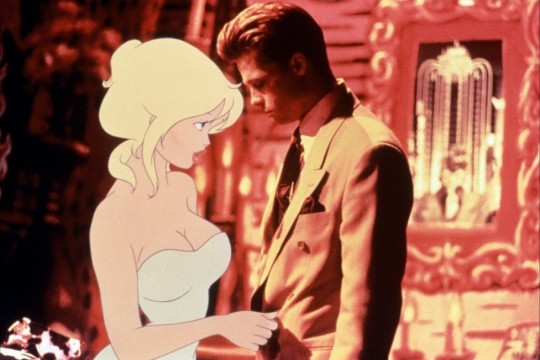
Holli Would (voiced by Kim Basinger) and Frank Harris (Brad Pitt) blur the lines in ‘Cool World’ (1992).
Existing in the same demented… space… as Space Jam, Paramount Pictures bought the idea for Cool World from Ralph Bakshi as it sought to have its own Roger Rabbit. While Brad Pitt described it as “Roger Rabbit on acid” ahead of release, Cool World itself looks like a nightmare version of Toontown. The film was universally panned at the time, caught awkwardly between being far too adult for children but too lacking in any real substance for adults (there’s something of a connective thread between Jessica Rabbit, Lola Bunny and Holli Would).
Ralph Bakshi’s risqué and calamitously horny formal experiment builds on the animator’s fascination with the relationship between the medium and the human body. Of course, he would go from the immensely detailed rotoscoping of Fire and Ice (1983) to clashing hand-drawn characters with real ones, something he had already touched upon in the seventies with Heavy Traffic and Coonskin, whose animated characters were drawn into real locations. But no one besides Bakshi quite knew what to do with the perverse concept of Brad Pitt as a noir detective trying to stop Gabriel Byrne’s cartoonist from having sex with a character that he drew—an animated Kim Basinger.
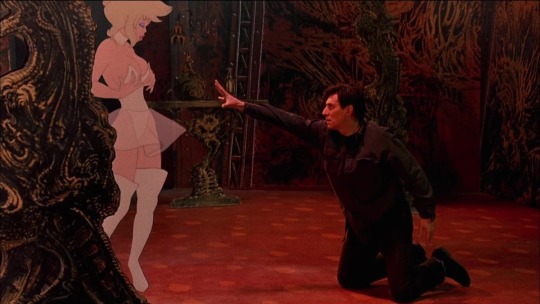
Jack Deebs (Gabriel Byrne) attempts to cross over to Hollie Would in ‘Cool World’ (1992).
Cool World’s awkwardness can be attributed to stilted interactions between Byrne, Pitt and the animated world, as well as studio meddling. Producer Frank Mancuso Jr (who was on the film due to his father running Paramount) demanded that the film be reworked into something PG-rated, against Bakshi’s wishes (he envisioned an R-rated horror), and the script was rewritten in secret. It went badly, so much so that Bakshi eventually punched Mancuso Jr in the face.
While Cool World averages two stars on Letterboxd, there are some enthusiastic holdouts. There are the people impressed by the insanity of it all, those who just love them a horny toon, and then there is Andrew, a five-star Cool World fan: “On the surface, it’s a Lovecraftian horror with Betty Boop as the villain, featuring a more impressive cityscape than Blade Runner and Dick Tracy combined, and multidimensional effects that make In the Mouth of Madness look like trash. The true star, however, proves to be the condensed surplus of unrelated gags clogging the arteries of the screen—in every corner is some of the silliest cel animation that will likely ever be created.”
There are even those who enjoy its “clear response to Who Framed Roger Rabbit”, with David writing that “the film presents a similar concept through the lens of the darkly comic, perverted world of the underground cartoonists”, though also noting that without Bakshi’s original script, the film is “a series of half steps and never really commits like it could”. Cool World feels both completely deranged and strangely low-energy, caught between different ideas as to how best to mix the two mediums. But it did give us a David Bowie jam.
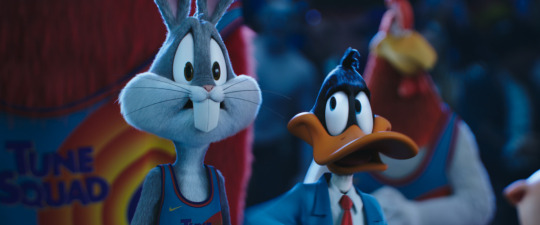
‘Space Jam: A New Legacy’ is in cinemas and on HBO Max now.
Craft is of course important, but generally speaking, maybe nowadays a commitment to silliness and a sincere love for the medium’s history is the thing that makes successful live-action/animation hybrids click. It’s an idea that doesn’t lend itself to being too cool, or even entirely palatable. The trick is to be as fully dotty as Mary Poppins, or steer into the gaucheness of the concept, à la Roger Rabbit and Looney Tunes: Back in Action.
It’s quite a tightrope to walk between good meta-comedy and a parade of references to intellectual property. The winningest strategy is to weave the characters into the tapestry of the plot and let the gags grow from there, rather than hoping their very inclusion is its own reward. Wait, you said what is coming out this week?
Related content
Rootfish Jones’s list of cartoons people are horny for
The 100 Sequences that Shaped Animation: the companion list to the Vulture story
Jose Moreno’s list of every animated film made from 1888 to the present
Follow Kambole on Letterboxd
#kambole campbell#mary poppins#ralph bakshi#hayao miyazaki#ghibli#disney#who framed roger rabbit#roger rabbit#spongebob squarepants#spongebob#animation#live action animation#live action animation hybrid#stop motion animation#stop motion#wes anderson#brad pitt#bob hoskins#genre#space jam#space jam a new legacy#michael jordan#lebron james#looney tunes#bugs bunny#daffy duck#warner bros#2d animation#letterboxd
26 notes
·
View notes
Text
Why did Dabi let Hawks into the League? (major manga spoilers ahead)
This is a question that’s been plaguing my head ever since Dabi proudly announced to Hawks that he’d known all along that he was lying.
If that was the case, what was the point of bringing him in? Surely Dabi must have seen this coming by enabling Hawks to continue his infiltration? What exactly was Dabi’s end-goal here???
It’s unclear whether or not if this will get explained eventually, but after giving it a lot of thought, I think I have a pretty good answer to the question regardless. Essay under the cut.
What is Dabi fighting for?
First, we have to address Dabi’s motivations. They run deeper than just making Stain’s will a reality - he’s taking steps that Stain never even considered to make, because even he was blinded by something that Dabi despises more than anything: hero idolization. Stain saw All Might as a true hero, someone worthy of the title, but in Dabi’s eyes, All Might is one of the biggest contributing factors to why there is such a huge problem with the hero system, and aside from All Might allowing other heroes to become complacent, it’s all because of Endeavour.
Hawks and Dabi are two sides of the same coin when it comes to the new no. 1; Hawks grew up seeing Endeavour’s ambition to surpass All Might as impressive and heroic, mostly due to the fact that Hawks himself lacks the drive to become so great, because all he wants is to live life comfortably. But for Dabi, Endeavour’s need to surpass All Might was nothing but a blinded greed for power, the need to be the best of the best for his own selfish desires rather than to actually save people. It was a path that led him to horrifically abuse his own family in order to achieve it, because he saw Quirk breeding as the only way to fix his own flaws. As such, Dabi, AKA Toya, suffered greatly at the hands of it. He knows firsthand just how much the hero system is unjust, allowing for people with unhealthy mindsets like Endeavour to gain positions of power. He knows that people admire Endeavour for his heroism, but are unaware of the monster that lurks behind closed doors, even when his temper comes out during public patrols. This is a man who is the very definition of a false hero, a man who let his eldest son die and traumatized his entire family.
Dabi goes on to claim in chapter 267 that there are no true heroes - this, however, does not mean that true heroes cannot exist. All he means is that there are simply no heroes currently present and he plans to change that, because in the system that society has right now, it’s near-impossible. Hero idolization forces heroes to become perfect images that people can admire, and it also enforces the mindset that only the greatest heroes can come from schools like UA and Shiketsu. This results in a flood of people longing to become heroes for reasons other than saving people. Uraraka, for example, while she is gentle and kind-hearted, is still only becoming a hero so she can support her family. It’s a well-paying job, and that kind of promise will most certainly lure anyone in who is desperate enough. Yes, she has good intentions in mind, and she does want to save people, but saving people is not her ultimate goal. So, by Dabi’s definition, she is not a true hero.
Becoming a hero should also not be as easy as it is, and becoming a hero certainly should not start at such a young age. UA and the other hero schools are putting teenagers between the ages of 15 - 19 at severe risk, and we’ve seen worst-case scenario results of this twice over the course of the series, and it’s terrifying to think that there are most likely more that we haven’t heard of.
First you have Shirakumo who died before he had even graduated, an incident that led him to becoming a nomu working for the League, who would then go on to cause the second result.
By placing children in such a dangerous training course, it automatically places targets on their backs for villains before they even get their licenses. The League proved just how incapable the staff are at protecting their students by not only successfully attacking a location within the school, but also kidnapping one of said students later on, even after UA’s attempt at keeping the location of the training camp hidden and Dabi himself had revealed their basic plan to Aizawa.
This is all fuel for Dabi’s fire in his journey to rip hero society apart at the seams, and while he is absolutely planning to kill every false hero he comes across, he also has a secondary plan in mind, and that is for the students.
In One’s Justice 2, Dabi has this particular voice line to Hawks: “We’re working for the glorious future where those UA kids are hollowed, and brought down to earth. We’ll have to see what you’re working for.”
Dabi knows that while they are all still young, there is still time to prevent them from falling into every hero’s brainwashed mindset: villains bad, heroes good, no matter what either of them do.
Something extremely important that the MVA and the current war arcs do is flip the black and white narratives on their heads, showing us just how human and empathetic the villains can be, while the heroes are doing nothing but making unheroic choices and opting for making the violent move first. We’ve seen all of the heroes do nothing but dehumanize Shigaraki, calling him “it” and “thing” like he’s just some monster that they have to kill. We’ve had to watch Hawks murder Twice in the name of “justice” simply because Twice refused to come quietly and be forced back into a life he felt miserable in. Even X-less chose to focus on the machinery next to him rather than getting a near-dead Shigaraki medical attention, and we all know how karma decided to treat that.
And this is where I would like to bring your attention to Tokoyami.
We’ve seen multiple times before how Dabi seems to have no interest in actually harming the students - initially, anyway. He leaves Aoyama alone even though he saw him; he taunts Shoto but doesn’t attack him to get him away; and lastly, Tokoyami first showing up to rescue Hawks actually calms Dabi down. Dabi shows no intent of hurting them because they’re still just kids, not heroes.
Calling back to how the heroes are currently being depicted as the ones making all the disturbing decisions, Dabi doesn’t hesitate to be the first to call out their decision to bring the students into what is essentially a covert-ops assassination mission that has turned into an all-out war. He first recognises that the boy in front of him is just that: a boy, and instead of attacking, Dabi gives Tokoyami a chance.
But what chance, exactly? To escape? Absolutely not.
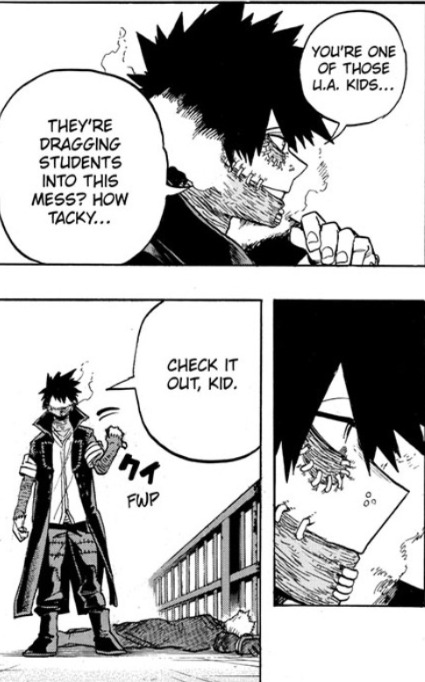
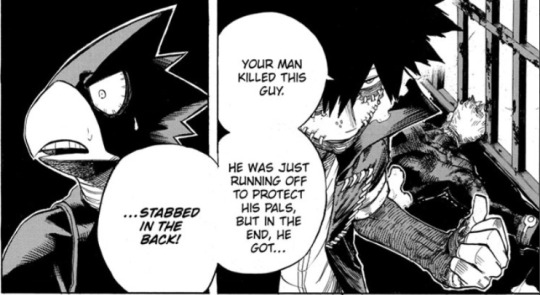
The first thing Dabi does is make Tokoyami aware of the crime his so-called mentor just committed, and carefully wording it so that the stakes were made clear.
Twice was trying to run away to protect his friends.
But Hawks still killed him.
Dabi is giving Tokoyami a chance to recognise that the hero system he admires hides many skeletons in its closet, and is something that is severely corrupt. He’s giving Tokoyami a chance to rethink his working relationship with Hawks and everything Hawks has taught him.
But Tokoyami doesn’t take it.

As soon as Hawks speaks up again, Tokoyami returns to being obedient, ignoring everything Dabi just said and focusing only on the task at hand regardless of the moral dilemma presented before him, and that’s when Dabi’s intention for Tokoyami changes, because as Dabi put it, “You’ve stopped thinking for yourself.”
And indeed, Tokoyami has. Tokoyami is now cemented in the brainwashed mindset, blindly putting his faith in that Hawks’s decision to kill Twice was right, simply because Twice is the villain and Hawks is the hero, and Dabi realises this.
Tokoyami is now a false hero, and thus on Dabi’s kill list.
So, we have established that Dabi fully intends to wipe-out existing false heroes, while simultaneously trying to save those who have the chance to recover/escape from the brainwashing before it’s too late.
“Keigo Takami!!”
It’s no secret that Dabi clearly knows exactly what kind of situation Hawks is in. The fact that he knows Hawks’s real name alone tells Hawks that Dabi knows far more than he is comfortable with. So, seeing as Dabi was able to see through Hawks’s lies so easily, let’s assume that Dabi knows most, if not all, of what we the readers know about Hawks and how the HPSC groomed him.
Considering that Dabi came from the no. 1 hero’s household, there’s a high chance that he knows quite a bit about the HPSC and just how shady they actually are, especially if the theories are true that they had a hand in covering up his own death. Dabi is well-aware then that the HPSC is responsible for the hero system being so broken, and the reason they do nothing to fix it is so they can stay in power. They are not afraid to make questionable decisions which they know is only making the villain situation worse, because villains are what’s keeping them in business. And what’s sad about this is that even when the decisions they present are clearly morally wrong, the heroes are in no position to argue, because the HPSC is in complete control of their jobs. The HPSC governs the hero system, so whatever they do must be just, right?
Well, Dabi definitely knows the answer to that.
The HPSC deliberately manipulated the heroes to believe that the UA students were needed on the front lines for this mission, and so far, we’ve seen that they really weren’t, actually. The evac team remains the best place for the students to be, because while the pros with all the combat experience can focus on the villains, the heroes-in-training can focus on the smaller task of getting people to safety. Sure, Kaminari, Tokoyami, and the other front-liners helped, but the pros absolutely overwhelmed the PLF on their own. All the front-liners did was just kind of...pave the way, make things easier, and then they were sent back to rejoin their classmates. And the heroes didn’t question the decision at all.
What’s even more disturbing is that the students weren’t even aware of what they were getting into, and most of the pros weren’t aware that the students weren’t aware.


But, as mentioned before, Dabi doesn’t hesitate to call this out.
It’s highly likely that he’s able to connect that the HPSC were the ones who organised this attack and sent the kids out onto the battlefield, which also means that he’s unfortunately no stranger to the HPSC reducing talented children to nothing but weapons, a concept he is also personally familiar with.
Toya was bred with the intent of creating a Quirk superior to Endeavour’s, and then put under extremely harmful training that abused both his mind and his body. We already know that Dabi is heavily against valuing a person’s Quirk over their individual worth, thanks to his fight with Geten.

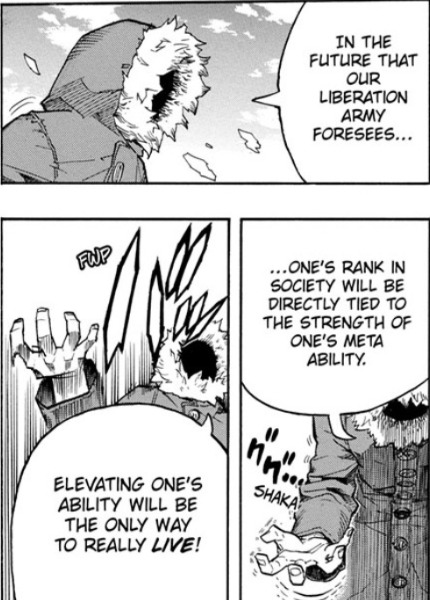


And in the world of heroics, this unhealthy mindset is unfortunately in abundance, especially in Hawks’s case.
What makes Hawks an especially tragic character is that he started out with the same longing to be a great hero that every child has. He wanted to be a comforting sight to those in need, and his innocent mind thought that the HPSC would help him make that reality.
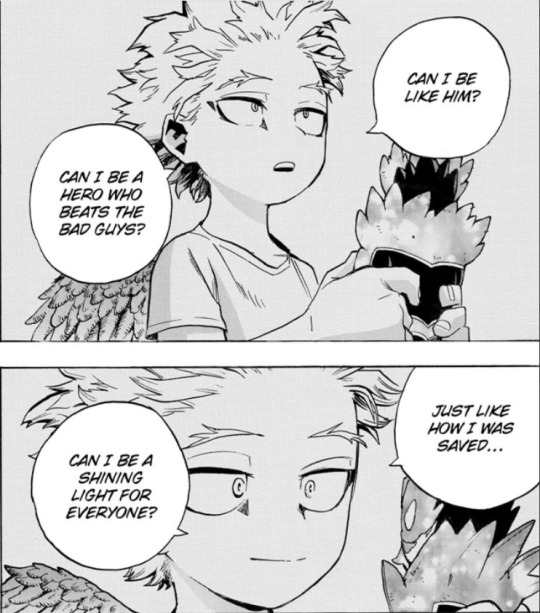
Instead, the HPSC presented him with a life-changing decision that a child his age has absolutely zero mental capacity to consent to, and it’s heartbreaking that Hawks’s grooming began right from the second they met. The HPSC forced a child into intensive training at an age even younger than students training at proper hero schools, and they ever-so-gradually began chipping away at Keigo’s hopeful dream, starting with the erasure of his own name, the first step in disconnecting him from who he once was.
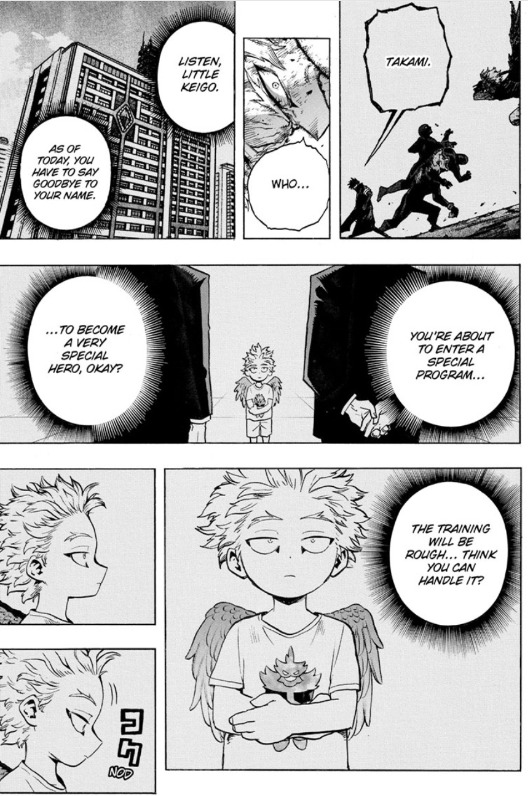
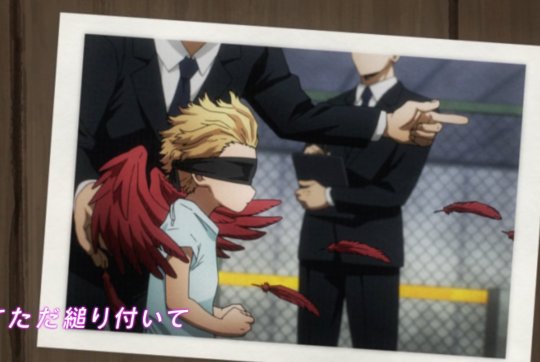
Over the years of the hero Hawks growing up under the HPSC’s wing, he had been stripped of his childhood and moulded into the perfect image of a hero, one that is loveable to the public, obedient to his handlers, talented in his work, and completely self-sacrificing to his missions.
The HPSC has successfully groomed Hawks so that his selflessness is now their trump card that they hold over him - instead of using his selflessness to save others no matter who they are, he’s been manipulated to believe that he has to give up everything in his life to be a great hero, that he’s not suited for being a “shining light”, thus bringing about his new goal of creating a world where heroes have free time, a goal that he is unfortunately pursuing in the wrong way. He’s been brainwashed to not think about villains too much, to not sympathize with them and dig into where they came from and why they became villains, which is why he’s targeting the wrong problem when it comes to making his dream a reality. He believes that he has to solve every case as fast as possible, and eventually there will be virtually no more villains left to hunt down, but the League has already shown us that the roots of villainy stretch much further down than that.
We catch a glimpse of how Hawks even acknowledges that he’s being held down by hero society, caged, and yet he does nothing to change it.
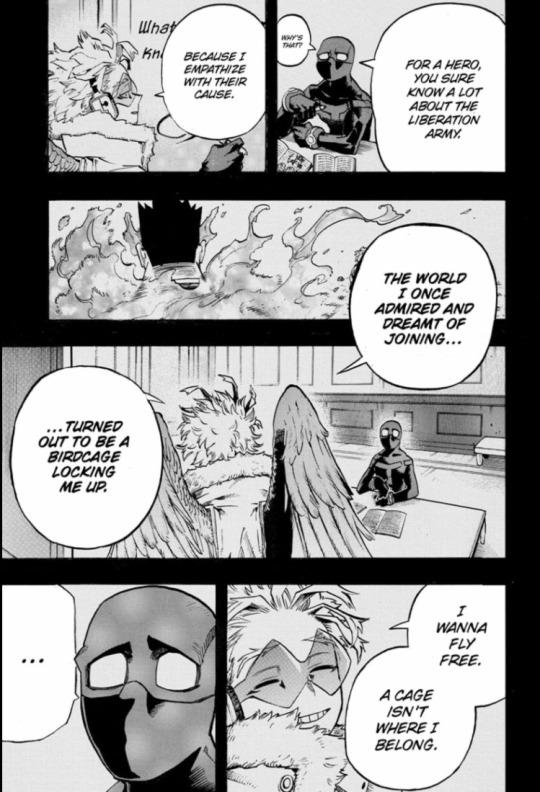
The result of his grooming has left him stuck in a thoughtless state, where it’s easier to believe that everything he is doing is right, and the villains are wrong.
And this is unfortunately something that he has spread to Tokoyami, as evidenced earlier.
Hawks is a hero who was groomed and manipulated from a young age, being thrown into training just so he could become a tool for those in power to use.
Sounds awfully familiar, doesn’t it?
Dabi can read Hawks like a book
It’s wonderfully ironic how Hawks prides himself in being capable of fooling anyone and everyone, making himself the hardest person in the room to read while simultaneously being able to read everyone else, and yet the one person that he couldn’t predict ends up being the only one who knows him better than anyone else.
Throughout all of their interactions, Dabi has always been two steps ahead of Hawks, able to catch him off-guard and ruffle his feathers. Keeping in mind that Dabi had known all along that Hawks was faking his desire to join the League, it’s interesting just how long Dabi kept stringing him along. Was he simply doing it for his own enjoyment?
Maybe a small part of him was, but in the long run, Dabi was absolutely still testing Hawks’s worthiness. What makes this great, however, is that Hawks was unaware that Dabi wasn’t testing him for what he originally thought.
Loyalty was absolutely out of the question for Dabi, since he knew from the start Hawks wasn’t planning on being as such. So, what exactly was Dabi looking for?
Looking through the tests that we know Dabi put Hawks through (the battle with Hood, and taking out a hero of Hawks’s choice), we can analyse what Dabi was impressed with, and what he wasn’t.
First off, there’s not a lot that Dabi didn’t like about what Hawks did. The most he complained about was Hawks simply bringing along Endeavour to the Hood fight instead of someone else.
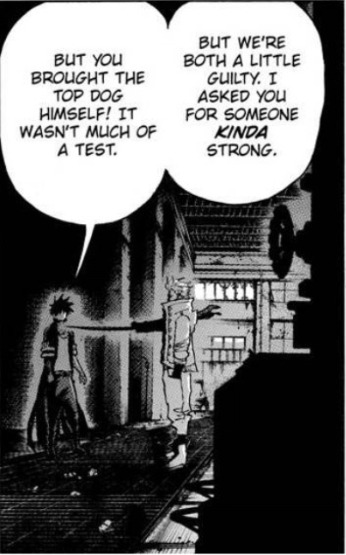
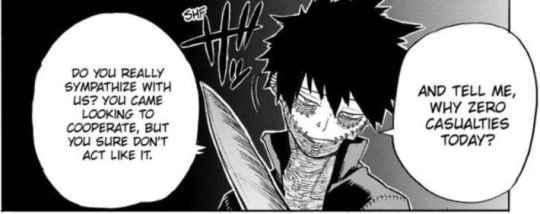
It appears that he also complains about Hawks not letting anyone die, but Dabi is always quick to point out when heroes are prioritising lives, and this will become important later.
Then, we have Dabi asking Hawks to take someone out who isn’t the no. 1. When Hawks brought him Jeanist’s body, Dabi was genuinely surprised, but pleasantly-so.



Now, Jeanist’s death here serves multiple narrative purposes:
It shows us that Hawks won’t hesitate to kill for a mission (RIP Twice),
It shows Dabi that Hawks is capable of killing anyone, not just villains,
And lastly, it serves as blackmail for Dabi in his pursuit of bringing down false heroes.
(There’s also Bakugo’s whole thing with his hero name, but this isn’t about him.)
That last point is what granted Hawks access into the League, contrary to Hawks believing that the only reason he got in is because the merging of the League and the MLA suddenly made it easy to do so.

Dabi wasn’t going to let Hawks in without making sure he had a backup in mind in case Hawks tripped up.
But, blackmail wasn’t the only thing that Dabi was looking for. If anything, it was just a bonus.
What the Hood battle and Jeanist’s death showed to Dabi were the two sides that Hawks possessed: a bird of prey that isn’t afraid to kill for a cause, and the innocent child who just wanted to help people. Dabi was searching for both of those qualities within Hawks, because they’re both qualities that Dabi himself has.
Dabi relates to Hawks
As previously mentioned, there’s no doubt that Dabi is aware of how Hawks was trained and forced into a life he didn’t want. He’s very aware of how much Hawks longs for freedom but still wants to help those in need, but what separates them from each other is that Dabi has achieved the freedom that Hawks wants and is pursuing his dream in a way that works.
Dabi kills for his cause, but that cause is ultimately to prevent the future suffering of innocent lives at the hands of false heroes. In his own twisted way, he too wants to save lives. He wants to stop the possibility of another him from being created. He is choosing to be the unfriendly reminder that something is very wrong with the current system, and it needs fixing ASAP.
And that is exactly why Dabi can see through Hawks’s lies, because he recognises that Hawks too is a victim of the same system.
Dabi’s plan for Hawks
With Hawks presenting himself in front of Dabi, it offered up a multitude of opportunities for him. Dabi not only had a new connection to Endeavour through Hawks, but here was a hero who was prepared to get his hands extremely dirty just for a way to bring down the League.
Dabi’s prior knowledge of Hawks and his past allowed him to constantly have the upper hand, but not in case Hawks attacked.
Through testing Hawks to see what qualities he possessed, Dabi was able to see if Hawks was worthy not for joining the League, but for undoing the brainwashing he’d been subjected to.
Dabi let Hawks into the League because he was giving him a chance, the same chance he gave to Tokoyami, to see hero society for what it really was and decide to do something about it. Dabi saw the potential in Hawks to be a true hero, to return to the boy he once was and save people for the sake of saving them. He saw Hawks’s potential to kill false heroes and that he wasn’t afraid to do it, and the idea of someone thinking the same way as Dabi, of understanding him and his goals wholly, would have absolutely been enticing to him.
Dabi claims to not care about the League, but even if that were true, Dabi recognises that the other League members are important to each other, especially when it comes to Twice and how eager he is to make friends. Dabi introducing Hawks to the League was his chance to show Hawks that they’re all human, and gain sympathy for them and what they stand for. It would have been the ultimate power move on Dabi’s part for Hawks to turn on the heroes and go villain, undoing what hero society did to him, providing him the freedom he always wanted and ultimately proving Dabi and his ideals right.
But, unfortunately, that wasn’t how things went.
How Dabi’s plan backfired
When Hawks first joined the PLF, it was obvious that Dabi was sticking close to him, both to keep an eye on him and to be genuinely friendly and accepting.

It’s rare to see a smile like this on Dabi when he’s around heroes, and he never smiles around the League, but for Hawks specifically, Dabi is always smiling. I think it’s safe to say that Dabi did genuinely enjoy Hawks’s company and that he was the only one Dabi actually liked, which is probably what led to him being comfortable with leaving Hawks to his own devices for the next few months, especially when he started a budding friendship with Twice.
Dabi must have been confident that Twice would be the one to break through the last of Hawks’s walls, because if we were seeing genuine smiles from Hawks, then Dabi must have seen them too.
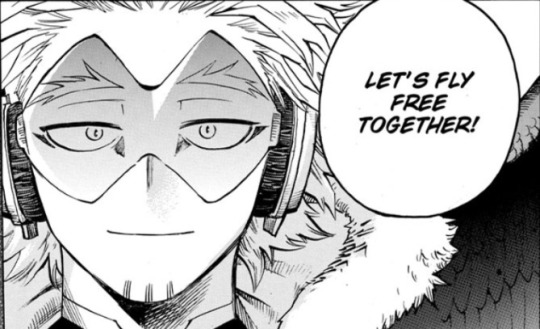
However, it’s clear that Dabi severely underestimated Hawks’s capability to kill anyone.
Hawks leaked the information to the heroes, an attack was launched, and Dabi immediately knew why.
And he was, understandably, incredibly pissed.
Upon confronting Hawks and hearing how he was about to kill Twice, Dabi used what he’d learned about Hawks during the Hood fight to his advantage and triggered Hawks’s rescue response, prompting him to subconsciously save Twice from Dabi’s flames, because Dabi knows deep down that a hero is who Hawks really is. What he was most likely hoping was for Hawks to maintain that response, but he instead made a mistake and directly caused Hawks to go back into mission-mode.
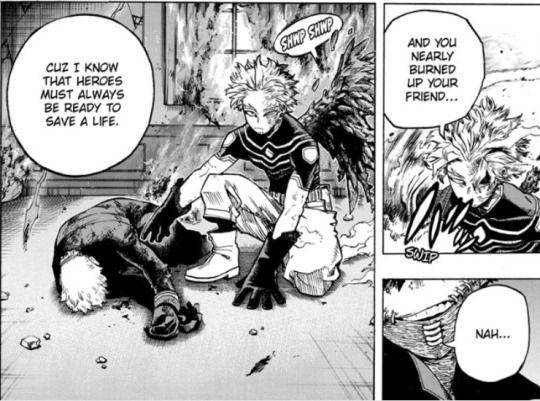


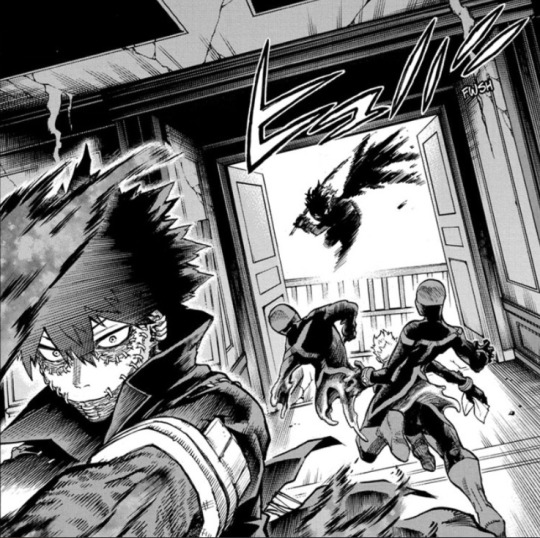
And it’s just a downward spiral from there, with all of Dabi’s last-ditch efforts falling flat. In one last desperate attempt to reach through to Hawks, he called out his name. His real name.

Dabi’s final chance to bring Hawks to his senses was to try and reconnect him with his past self of whom the HPSC had carefully erased, and it almost worked. Dabi let Hawks know that he knew everything about him, everything that he once was, but just like with Tokoyami, Dabi learnt the hard way that Hawks was beyond saving.
With Twice’s death, Dabi completely lost it, scolded Hawks for not focusing on him, and dropped one last bomb on Hawks before ending yet another false hero.
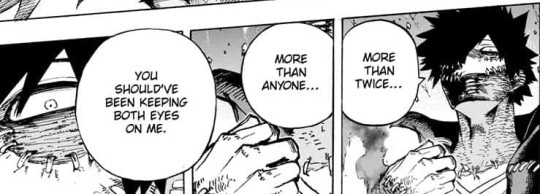

Until, yet again, that too backfired due to Dabi’s hope that he could save an innocent mind from the hero system’s brainwashing, and Hawks escaped with his life.
We get a glimpse of Dabi’s defeated expression, the knowledge that he can’t cry, and that he just lost two friends within the span of just a few minutes.


What next?
Honestly, if there’s one thing that is going to break Hawks, it’s knowing the truth about Endeavour. My hope is that Dabi is going to have a chance to make his reveal public to the entire nation, and exposing Enji Todoroki for the abuser he is will really shake things up.
At the moment, it’s still not clear exactly what Dabi told Hawks in his redacted bubble, but it was obviously something relating to his identity. Only time will tell what Hawks knows once he regains consciousness.
#dabihawks#dabi#mha hawks#bnha hawks#boku no hero academia#my hero academia#mha#bnha#theory#dabi is a todoroki#mha manga spoilers#bnha manga spoilers
294 notes
·
View notes
Note
Top ten princesses!
*rubs hands together* Alright, let’s rank us some Disney princesses. Technically there’s only four others who aren’t gonna make the cut buuuut they’re the four I don’t really like XD
10: Pocahontas (Pocahontas)

With Pocahontas, you can very clearly see the behind the scenes "self-consciousness" of the filmmakers baked into her character writing. Pocahontas was Disney's big attempt at Oscar gold, trying to tell a Big Important portentous story while also grappling with trying to make Pocahontas as inoffensive as possible. The result is a character who is kind and likable enough, but also kind of wooden. The historical accuracy value is practically nil, and Pocahontas as a character and a movie comes off worse and worse with the passage of time. All that being said, I think Disney did the very best job they could with Pocahontas given the situation she emerged in. They created a character who is likable, free-spirited, a strong believer in justice and unity, and a character who leads with empathy and courage at the forefront. If nothing else, Pocahontas is a strong role model for little girls to look up to, and her love story with John Smith is one of Disney's most mature love stories as well, so there's plenty for older fans to enjoy as well.
9: Mulan (Mulan)
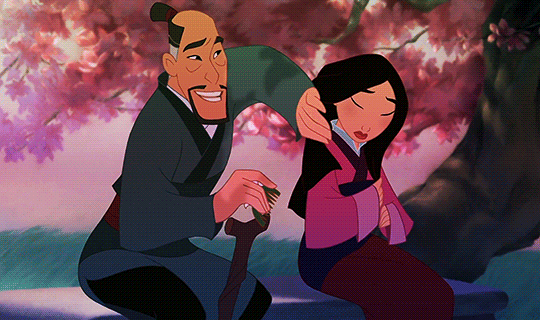
Mulan is counted as a Disney princess because they don't have any other Asian princesses and they wanted a more diverse lineup. That's the reason. Y'all can stop pretending not to know now. But with that strange categorizing, Mulan is weird fixture of the princess lineup any way you look at her. Mulan, for me, both as a princess and a movie, has always been just kind of there. A lot of people passionately love it, and I get that completely. A lot of people tear it apart, and I get that too. Mulan is a great girl power character, and her resourcefulness and cleverness being her defining trait is excellent. Her internal turmoil over her identity is perhaps more poignant here than with any other princess, and Reflection still stands as one of the greatest Disney songs ever written. That said, Mulan's defining character flaw being clumsiness and awkwardness and this being why she has such internal turmoil about fitting in just makes her come off as a bit hollow to me, and I feel like there was a better route to take her. After how surprisingly good an LGBT take on her worked over in Once Upon a Time and how much better that informed her feeling like an outsider, it just made the animated version come off as weaker on the internal side to me. Good character overall, though, and I do really like Mulan.
8: Moana (Moana)

Moana has a similar situation to Mulan where she's not really a princess but she gets shoehorned into the princess mold because they have nowhere else to put her. She and Mulan are Disney heroes, and they have different expectations for that reason. All that being said, Moana is easily the best of the Revival era CGI princesses. For one thing, while she has a bit of the Revival trend of modernizing the princesses too much, they don't make her overly adorkable to make her relatable (... “overly” being the key word; she’s not exempt). On the contrary, Moana is written very much like a person. We see Moana grapple with the weight of duty both to her people and to the world as a whole. Her story is one of trying figure out whether it is better to chase the unknown or to follow the tried and true. And I like that. I also really appreciate how Moana wins the final battle with empathy for the monster, and that's what makes her unique. The whole "Know Who You Are" musical number is legitimately one of the most powerful moments ever put into a Disney film too. My biggest issue with her actually comes from Maui whose constant meta quips and spotlight stealing tends to undermine Moana's character a lot and takes away from some of her moments that I wish hit harder than they do.
7: Jasmine (Aladdin)
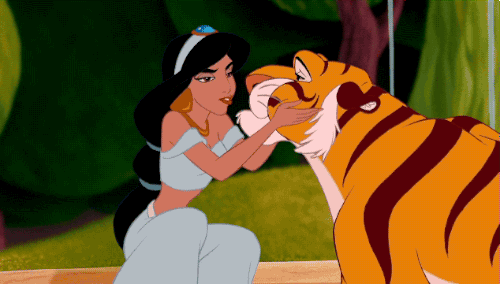
Jasmine is the only princess in the lineup who is not the main character of her movie. On the contrary, she's the love interest of the main character and more of a supporting player in her film. She doesn't even get a solo, something every other princess, save Merida who isn't in a musical, gets. As a result of this, Jasmine isn't really as strong in her own right as several of the other princesses. But she's still awesome. She has a strong internal life and vibrancy, and the way her character revolves around a longing for freedom and the way that compares to Aladdin and the Genie makes her really come alive and work well within the context of the film. She's also clever, resourceful, a self proclaimed fast-learner, and someone who never allows her voice to be silenced. Yet even with all her strength, she's allowed tender moments of kindness and gentleness to show that there's another side to her. Also the TV series and sequels expanded on her character in a wonderful way.
6: Tiana (The Princess and the Frog)
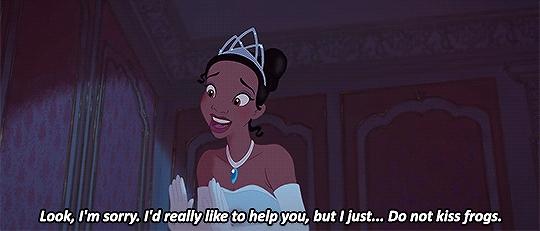
Okay, yes, Disney's first black princess being a frog for more than half the movie was a bad creative decision on their part that wasn't a good look. But for Disney's first black princess, considering the company's history with race issues in particular and how self-conscious a lot of their princesses of color have come off, I think a lot of people underestimate just how good Tiana is. Tiana is vibrant and full of personality without every coming off as a stereotype or as anything less than dignified and admirable. She's hard worker, but she never comes off to me as trying to be "look how much better I am than the other princesses." She lets her actions and her character speak for themselves. I like that her arc is actually about finding a healthy balance between storybook love and wishing and hard work and determination. She's a woman with ambition, but she also learns to make time for a bit of fairytale fantasy and the things that really count like love and friendship. Also, just major props to Anika Noni Rose for making Tiana so damn likable and fun to follow.
5: Aurora (Sleeping Beauty)
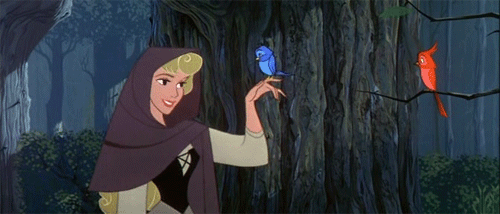
And now that we're in the top five, we start getting into the classics. Aurora gets an unfair reputation as a basic boring princess who needs a man to save her and has no value of her own. But with Sleeping Beauty being an adaptation of ballet in particular, that's really missing the forest for the trees. Sleeping Beauty was envisioned by Walt as the pinnacle of animation, an animated film that would stand tall in an art gallery, and you can see that very much at play in Aurora. From Marc Davis's absolutely stunning animation on her to Mary Costa's beautiful vocal work in blending with the musical stylings of Tchaikovsky, Aurora is, more than any other princess in the Disney lineup, a piece of high art. She's written deceptively simply to allow for the animation and the music to convey the brunt of her character. And, when you get right down to it, Aurora is, like art, designed around the emotions of the piece more than specific character quirks. Yet the essence of her kindness, of her grace, and of her sly looks and shrewd coyness is all right there in the character. She also pretty perfectly encapsulates the emotions and feelings of young love, and I think there's a lot of value in that portrayal as well.
4: Ariel (The Little Mermaid)
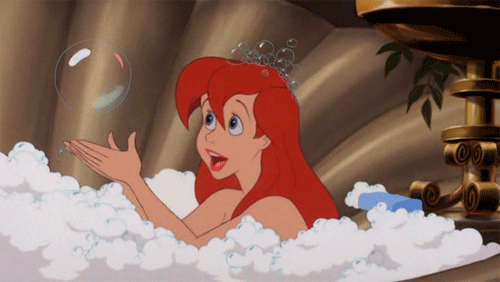
I used to give Ariel a hard time in the recent past, and I fully regret allowing certain sects of discourse to color my view of her. Ariel is an amazing character, and an excellent princess. One of the things that has struck me, revisiting the movie as a gay adult, is just how queer of a story Ariel's is. Hans Christian Anderson wrote the original in response to male lover of his, openly gay Howard Ashman was a major creative driving force behind the story, and openly gay animator Andreas Deja brought to life the visceral Grotto scene based on his falling out with his own father. There's queerness baked into the fabric of this film, and it shows itself clearly with the narrative of a princess who is unhappy with her home life and has a forbidden love that she must hide away from her own family and then must undergo the process of evolving into the version of herself that she wants to be in order to satisfy the love within herself. She gets dismissed as being just a rebellious teenager, but there's so much more to her than that and she hits home to so many people for that reason. Also, Jodi Benson's incredible voice work and the writing for her makes Ariel constantly a vibrant and interesting character who I feel like we get to know better and more intimately than almost any other princess.
3: Cinderella (Cinderella)

Though, much like Aurora and Ariel, Cinderella gets an unfair reputation as weak and needing a man, that couldn't be further from the truth. Cinderella is an abuse survivor who keeps her dreams, optimism, and kindness alive even in the face of crippling despair and misery. She's a woman who fought a daily battle just for the right to keep existing, and while the Fairy Godmother gave her magical assistance, Cinderella earned her happy ending herself. I just have to admire how she embodies patience and kindness while also still being strong in her own way. She's not a masculine warrior action figure; she's very feminine. Yet she finds strength in her femininity without relying on sex, and I just think that's wonderful. I also really love how much personality and humanity they filled Cinderella with without going overboard or making her into a parody of herself. Cinderella maintains the grace, poise, and beauty of a princess all while having so many little quirks and traits that make her feel like a real woman. Also, it must be said, Cinderella III is still the best Disney sequel, and I love how it expands upon her and gives her new opportunities to prove herself all while maintaining the core kindness and strength of her character.
2: Snow White (Snow White and the Seven Dwarfs)
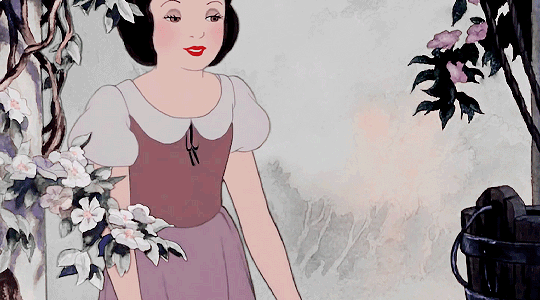
The one that started it all and still a radiant joy of beauty and kindness, Snow White is everything a princess should be. Like Cinderella, Snow White shows that you can survive abusive situations with your positivity in tact. In fact, Snow White goes one step further. She shows that "there's no use in grumbling when raindrops come tumbling; remember you're the one who can fill the world with sunshine." She's a beacon of hope and positivity who shows that compassion and kindness are the true virtues that deserve to be held as the most precious. She also shows the importance of found family and finding a loving support system that is right for you even if that's not your actual family members. In addition to all that, Snow White is great for being full of personality and having a vibrancy to her. She meets the dwarfs and immediately begins to take charge and to hold them to the standards she expects. She's never afraid to make her voice or opinion heard, and she's also got a playful teasing side to her that shines through. While her film is a heightened reality, she still has a core realness to her that makes her plight and her adventure feel all the more immersive for a viewer.
1: Belle (Beauty and the Beast)
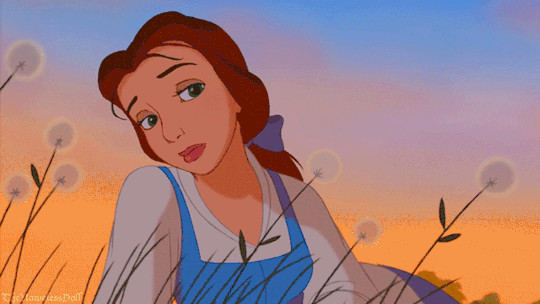
But my favorite princess is always plain to see. While I love many of the other princesses, none quite hit that same sweet spot for me that Belle does. Belle is an outcast. She's a well read and intelligent woman more concerned with books and ideas of adventure than she is with the types of things she's expected to be concerned with by her small town. According to the townsfolk, she should be only concerned with getting married to a handsome man and being his doting little wife. However, Belle has absolutely no interest in taking part in any of that nonsense, and because of that, the people of her hometown write her off as odd or crazy. Many of us have been in a similar situation and felt excluded from society because we were somehow "not normal." Whether it was for our sexualities, our weight, our skin color, our religious beliefs, our over abundant love of comic books, or what have you, many people out there feel alone and ostracized. Yet Belle is that shining beacon of someone who lives her authentic life no matter what the world around her thinks, and that can give courage to others who relate to those feelings. Belle inspires the Beast to change to be better for her, not because she can break a spell, but because she sees the true beauty inside of him that no one else ever had. Some of my favorite types of heroes are those individuals who see the good inside of everyone. Those who give everyone a fair chance, especially to those who were never given a chance by anyone before, are the type of heroes we need more of in real life. No she can't fight off villains or complete daring feats of physical prowess, but she doesn't have to do those things to make a difference. She can save an entire castle by goodness and compassion alone. Paige O'Hara really does a fantastic job filling Belle with personality as well. I love that her voice work conveys confidence and strength, but also has moments of gentleness and vulnerability. She's allowed to have a range of emotions and certain spunk that is nothing short of endearing. Special mention must go to how excited and energized O'Hara plays Belle as getting when she talks about her books and stories. You really get the sense that reading is Belle's passion, not just something she enjoys. There's a real sense that Belle experiences the world around her fully and vigorously, and that adds to the charm of her character that makes her, for me, the most likable and best of the Disney princesses.
#disney princesses#Belle#Snow White#Cinderella#Ariel#Aurora#Princess Tiana#Jasmine#Moana#Mulan#Pocahontas#marciabrady#I also just did the lineup princesses otherwise Eilonwy and Meg and Esmeralda would have ranked
39 notes
·
View notes
Text

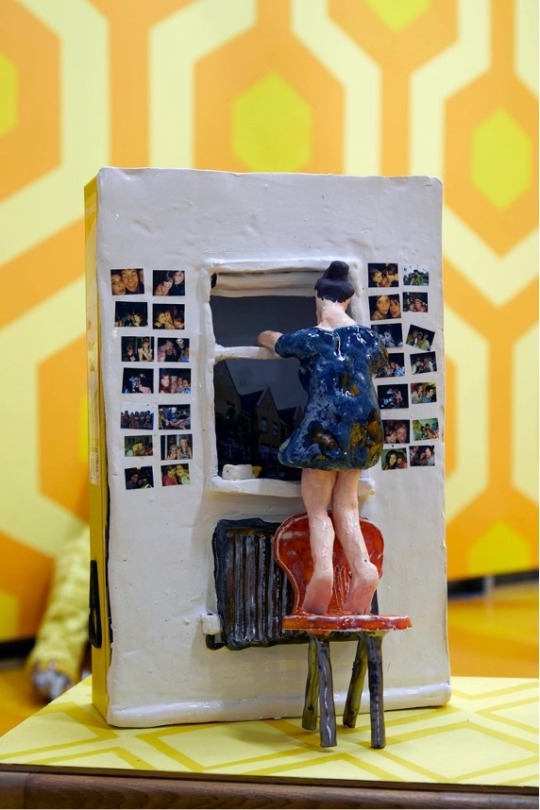
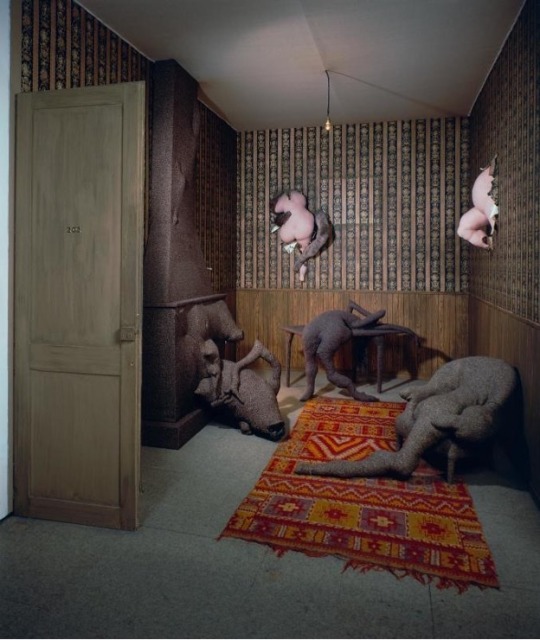
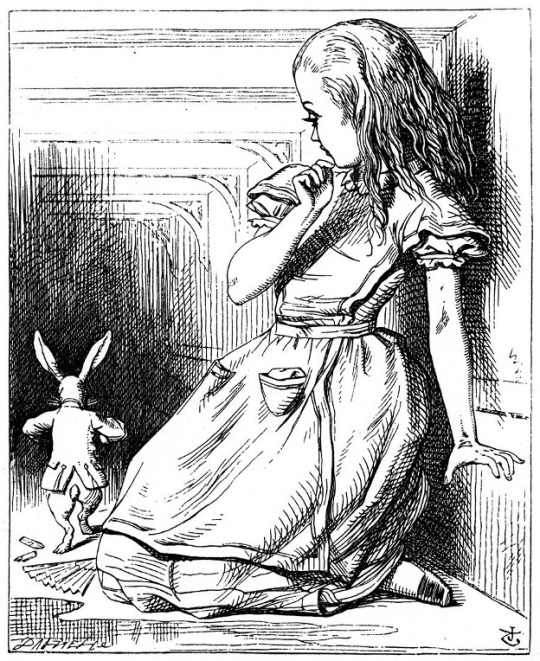
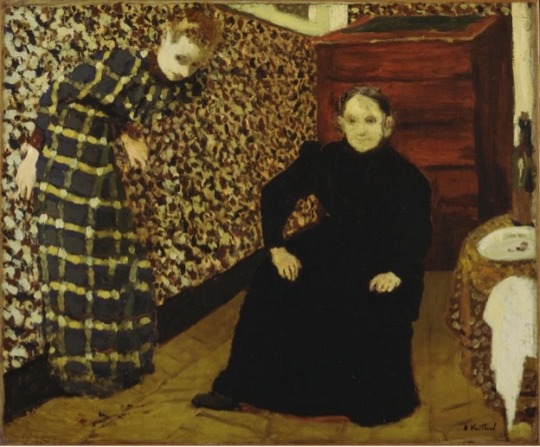
FA222 ,principles of graphic design:
Instructor: mr.munwar mukhtar
@uob-funoon @mnwrzmn
Project 1 : design
Covering up the Cracks: The Return of Wallpaper
How artists from Édouard Vuillard to Dorothea Tanning and Kehinde Wiley used wallpaper in their work
Forget fragrant roses and honeysuckle. Forget soft-throated songbirds and sunflowers. I always see spiders in wallpaper. My eyes trace the patterns, searching them out, those crooked arachnids. The mere hint of one turns my stomach. Look: there’s one! Tarantula-black, wriggling through that ivy-blossom, crouching behind those camellias. See its distended abdomen, those unwieldy legs?
What this says about me, I don’t want to know, but spiders also spring to mind whenever I think of a certain painting by Édouard Vuillard. Interior, Mother and Sister of the Artist (1893) is a most peculiar work, wrought with invisible tensions. The manner in which Vuillard configures his mother and sister hints at a curious dynamic, one more commonly imagined between a spider and a fly. Here is Madame Vuillard, a throbbing black presence, legs set wide apart, hands placed defiantly on her knees in as dominant and sinister a pose as she can muster. To the left, Vuillard’s sister, Marie (or Mimi as she was known within the family), looks as if she is being engulfed by the wallpaper. Or is she already trapped? Can you hear the frantic buzzing as she struggles to escape? It’s almost unbearable. Marie is ensnared; it’s as if Madame Vuillard has forced her into a web. The awkward angle at which Vuillard composes his picture fosters this tension. Somehow, the artist seems to suggest, maman is driving her daughter into dangerous territory.
Or is she? Is Vuillard really attempting to convey that his mother is pushing his sister not only to the limits of physical space, but also of sanity? Although the narrative is not explicit, Vuillard painted several similar portraits of his mother and sister that imply domestic disharmony. In The Door Ajar (1891), for example, Marie appears alone, this time peering into a room as if she wants simultaneously to enter and retreat. Marie’s dress and the wallpaper are barely distinguishable from one another: the maggoty yellow pattern of the latter insidiously overlaps with the strange crescent moons of the former to suggest … what exactly? Is Marie, once again, being pushed in to the web of the wallpaper? Or is something else at play? Could Vuillard be trying to capture some deep-seated predisposition in his sister? Perhaps, psychologically speaking, Marie wants to entwine herself with the background of life. As in Interior, Mother and Sister of the Artist, rather than being pushed out of the room by maman, Marie is perhaps choosing to contort her body so as to escape? Whatever the case, for Vuillard, wallpaper is never simply decorative. Loaded with narratives, in the artist’s hands it becomes a metaphor for the divide between physical and psychological space, between inner and outer realities.
A little less than 100 years after Vuillard completed Interior, Mother and Sister of the Artist, a young woman on the east coast of America took a series of photographs, ‘Space2, Providence, Rhode Island’ (1976–77), one of which could stand as a companion piece to his painting. An eerie connection exists between the two works, a conversation of sorts across the decades. Here is the image of another young woman who appears to want to escape and who uses wallpaper as the means by which to do so. Unlike Marie, however, who is the subject of her brother’s narrative, the woman in this photograph is most definitely the author of her own disappearance. Using strips of paper to cover her face, breasts and legs, Francesca Woodman attempts to take herself out of the photographs she so carefully constructs. Like wallpaper itself, with its repeating patterns and shapes, the desire to remove herself from the picture occurs throughout Woodman’s work.
In other self-portraits, Woodman crouches beneath a tilted door, disappears through a wall, merges with mirrors, windows and fireplaces. She is a ghost light, a will-’o-the-wisp, a haze and a blur; present only in her absence, a non sequitur made physical. Indeed, looking every bit like Lewis Carroll’s Alice in Wonderland (1865), with her long blonde hair, floor-length skirts and black pumps, Woodman seems desperate to slip beyond the here and now, to use every available surface in order to vanish – not into Wonderland, but towards some other dimension. Ironically, much like the Cheshire Cat whose smile lingers long after the rest of his body has disappeared, by highlighting herself in the act of vanishing, Woodman’s spectral presence grows ever more compelling. Who is this beguiling figure dedicated to both evading and haunting? The answer is never clear. In fact, the nearest we come to it might be the manner of the photographer’s death. In 1981, at the age of 22, Woodman took her own life by jumping out of a window.
Appearance and disappearance. Repeating patterns and shapes. Integration and disintegration. A year before Vuillard completed Interior, Mother and Sister of the Artist, a novel was published in America that foreshadowed it. The Yellow Wallpaper (1892) by Charlotte Perkins Gilman takes as its subject the agonizing mental decline of an unnamed narrator who has just given birth. Confined by her husband to an upstairs nursery with bars at the window, the woman is advised to empty her mind and do nothing but rest. Instead, she begins to tell us about her predicament. Having been deprived of any mental stimulation, she begins to believe she has seen glimpses of a woman trapped behind the room’s sickly yellow wallpaper. As a metaphor for the morbidly restrictive society into which 19th-century, middle-class women were born, The Yellow Wallpaper is highly effective; on a psychological level, it is unsurpassed. As with the walls in Vuillard’s painting, the paper crawls with meaning; the narrator projects her fears onto its ‘bloated curves and flourishes’, its ‘sprawling flamboyant patterns’ and ‘wallowing seaweeds’ until, finally, they take on a life of their own and begin to seep through the paper in the shape of a deranged ‘other’. The wallpaper, in other words, has become a reproduction of what is playing out in the narrator’s misshapen psyche.
It is hard to think of Gilman’s work without being reminded of that doyen of the 19th-century British arts and crafts movement, William Morris. The intricate wallpapers and textile designs he created for Victorian homes could easily have graced the room in which Gilman’s narrator was incarcerated. This made American artist Kehinde Wiley’s first UK museum solo show, ‘The Yellow Wallpaper’, at William Morris Gallery in London earlier this year more than a little intriguing. ‘The Yellow Wallpaper is something that has haunted me for years,’ Wiley says of the novella in a short film about the making of this work. ‘The idea of being in a room and not being taken seriously.’ This is not something that can be said of the six black women and two children Wiley met on the streets of east London, whose strikingly beautiful portraits filled the exhibition. Whether sitting or standing, whether their faces turn away or directly look out, each sitter is centre stage. More than that, each is engaged in a serious dialogue with the background patterns from which they emerge. These patterns are based on Morris’s own wallpaper designs that would have papered the walls of mansions inhabited by, among others, former slave-traders and plantation owners. In doing so, Wiley’s work plays on the conflict between the sinister history embedded in the prettiest detailing and the self-possessed women who emerge from the patterns, who seem to defy anyone to repeat it.
Lindsey Mendick, ‘The Yellow Wallpaper’, 2020, installation detail, Eastside Projects,Birmingham. Courtesy: the artist and Eastside Projects; photograph: Stuart Whipps
Coincidentally, artist and sculptor Lindsey Mendick’s exhibition at Eastside Projects in Birmingham earlier this year was also titled ‘The Yellow Wallpaper’. Featuring untitled videos, ceramics and miniatures, the show pivots on a disturbing episode in the artist’s life when, during a nervous breakdown in 2006, Mendick glanced from her bedroom window to see six men dressed in black, walking up and down the street speaking into walkie-talkies. Mendick related the incident to her mother who, given her daughter’s vulnerable state of mind, found the story difficult to believe. A few days later, however, news broke that the former Russian spy, Alexander Litvinenko, had been poisoned; he was Mendick’s neighbour.
Unlike Gilman’s narrator, what Mendick had seen was real; however, in her exhibition she, too, played with the idea of wallpaper as a borderland between sanity and insanity. The show also included other domestic items as receptacles into or onto which all that was unendurable could be projected. A large teapot (with a hole in one side through which you could view the vessel’s interior) contained two small ceramic figures taking tea from a large teapot containing two ceramic figures taking tea from a teapot, in what felt like a claustrophobic dance to the death. Nor did the claustrophobia end there, for all the pieces in the small, over-lit gallery spoke of other confined and confining spaces – from the hollowed-out, ceramic head of Russian President Vladimir Putin, inside which the figure of a distraught woman (Mendick herself?) sits on a toilet within a cramped bathroom, to a 1960s-style bedside cabinet inside which reside Mendick’s family members, configured weirdly as Russian dolls. But, of all the dialogues taking place inside this room, the loudest is also the most hallucinatory: the one inside my own head between Gilman and Mendick. What is it they are saying? That yellow is an unfortunate colour with which to decorate a room? That the divide between sanity and insanity is paper-thin? Or that even the most innocuous of objects can pulsate with the unconscious?
This is a sentiment with which the surrealist artist, sculptor and writer Dorothea Tanning would surely have agreed. Writing in the catalogue for her 1979 exhibition at New York’s Gimpel-Wietzenhoffer Gallery, she declared of her hometown of Galesburg, in rural Illinois, that ‘nothing happened but the wallpaper’. Tanning’s Chambre 202, Hôtel du Pavot (1970–73) is a three-dimensional, life-sized room in which two grubby pink torsos, shaped as if carved from ham, poke through the dingy wallpaper while the chimney breast gives birth to three further mutations – although whether these are animal, vegetable or some other tumorous mash-up, it is impossible to say. The work was partly inspired by a song Tanning recalled from her childhood: ‘In Room 202’ (1919) composed by Dave Harris with lyrics by Edgar Leslie and Bert Kalmar, tells the story of Kitty Kane, a gangster’s moll who poisoned herself while staying at a hotel in Chicago.
In room two hundred and two The walls keep talkin’ to you I’ll never tell you what they said So turn out the light and come to bed.
But if the song suggests talking walls, Tanning pushes this idea to its very edge, wishing to create a space in which the wallpaper, as she once explained, would ‘tear with screams’ while maintaining ‘an odd banality’. The latter is captured by the dreary ordinariness of the installation’s wallpaper while the former is contained in the hotel’s name: pavot is French for poppy, the flower from which opium is derived. By conflating these disparate ideas, Tanning succeeds in heightening the room’s creepiness; this in turn precipitates a sense of impending doom. What springs to mind is a back-street abortionist’s or the lair of a serial killer such as John Christie who, over several months in the early 1950s, murdered (among others) Kathleen Maloney, Rita Nelson and Hectorina MacLennan, hiding their bodies in a kitchen alcove, which he subsequently wallpapered over as if it were a solid wall. The women’s bodies were only discovered after Christie moved out of the house and his landlord, wanting to redecorate, tapped on what he thought was the rear wall to the kitchen only to discover it was hollow. As Ludovic Kennedy wrote in Ten Rillington Place (1961), the landlord then ‘pulled away a small piece of paper and shone his torch inside. Whatever he expected to see, it could hardly have been what he did see: the naked seated body of Hectorina MacLennan.’ You can almost envisage the landlord stumbling backwards in horror, just as the chambermaid might have done when she pushed open the door to Chambre 202. This is a room that distils much of what the work of Mendick, Vuillard, Wiley and Woodman makes clear: that wallpaper does not so much cover the cracks, as serve to reveal them.
Main image: Lindsey Mendick, ‘The Yellow Wallpaper’, 2020, installation view, Eastside Projects, Birmingham. Courtesy: the artist and Eastside Projects; photograph: Stuart Whipps
11 notes
·
View notes
Text
show me how
Pairings: SasuSaku Fandom: Naruto Rating: M Genre/Tags: AU; in which Sasuke is a driver, Sakura plays no games; also has an underground fight club; sexual tension; dominant Sakura; Uchiha bros being bros Ao3 | twt
In which Sasuke is the new driver for the Haruno heiress — and therefore, prey.
[In the words of Rihanna, You look like you can handle what’s under my hood // you keep saying that you will, boy, I wish you would.]
❦
His mother would say he’s aiming a bit above his station, lip-chewing, worrisome; his father would disapprove, thinking the new client spoiled.
Itachi, greyish eyes twinkling with some genial but teasing expression, shifts to let his ponytail tumble down his back. Women adore the look; Sasuke likens it to a horsetail well within earshot every chance he gets. Brothers, you know.
Pinching the photo between thumb and forefinger with hesitancy, the lack of commitment stark as a first app-date gone sour and seeking escape, Sasuke knows he’s pouting and he knows Itachi’s amused.
“I’d have taken her,” he consoles softly — Sasuke hates that tone too, like he’s chivvying a hot-tempered horse into his stable, oh gods, fuck Itachi for this — “but out of the two she requested you. Very taken with your photo.”
“Itachi.” The given name comes through gritted teeth, and Itachi struggles not to smile. Sasuke hopes the effort’s absolutely killing him. “This is the Haruno heiress. Pink hair, red temper?”
“Funny, I do know. Almost as if she’s famous, dear brother.”
“Infamous. For killing her last driver.”
“Oh, come now.”
“Running him off. Driving him to insanity.” And here Sasuke jabs the finger of his free hand against the photographed face: smiling, with a sharp gleam in her jade eyes. He punctuates each syllable against her cheek, “Take—your—pick!”
Itachi’s tongue clicks continue to conjure pastoral images of horses and other farmish animals, and Sasuke thinks this unasked for, supernatural form of punishment is a right divine kick in the mouth.
“For what it’s worth, I’m sure the talk is mostly nonsense,” he soothes. Bending to behold the portrait shot further, he rests his fingers against his mouth. Pensive. People often adore that too. “After all, she’s cleaned up her image quite a bit.” Itachi extends his hand, counting off her improvements: “Issued apologies for the yacht incident—”
“Pretty sure she’s banned from the piers now.”
“Recovered brilliantly from her very public and messy breakup with the Hyuuga heir—”
“A piece of shit, granted, but she still keyed his car, and then his face—”
“Even had a great photo-op of visiting Uzumaki Naruto in the hospital—”
“That she put him in.”
“She even disbanded her underground fight club,” Itachi added, plucking the photo and folder from his younger brother’s hands, a final that’s that!
“Her what?”
“Bad optics. Oh, and you start Monday.” He pats a stunned Sasuke gently on the shoulder; not one to easily manage particularly happy or buoyant expressions, he prays to whatever forces or deities exist that he’s been passed over for the coveted yet dangerous position of personal driver for Miss Sakura Haruno.
.
Driver — ah, the term is misleading. A position often including, but not limited to: Chauffeur, personal assistant, event planner, bodyguard, bookkeeper, and occasionally dragging paparazzi out of the bushes by their lapels, testing meals for poison, and smuggling her short-term affairs in and out of back building doors.
A skittish attendant is the only witness to the moment in which he meets her in person.
Sunshowers, an unnatural brightness like daylight thunderstorms; a presence difficult to face head-on. Slender and swagger, something in the way she walks suggesting she’s aware of exactly who she is and what he’s probably heard, keen eyes plucking his thoughts from his soupy skull by slice and piece only to toss them aside, limp, discarded.
And she’s gorgeous. Beauty in lethality, the inherent quality pined for in mythological Olympian goddesses and well-crafted guns and dangerous and unwieldy luxury cars. The wreckage left in their wake easy to augur with plain eyes if anyone can resist the siren song.
Sasuke’s hands are clammy when they shake. She notices, with a gaze like whetted glass.
Fuck Itachi. Fuck this. Fuck me.
“How do you like to be addressed . . . Miss Haruno?”
A smirk plays on her lips. “Not like that, for damn sure. Sakura’s fine. Let’s go.”
She’s opening her own car door and about to lower herself in before he snaps to — the tyranny of her heels against the cobblestones twists him into impossible nautical knots.
“I don’t care if you get the door,” she says, “but Tsunade’ll have your head.” With a jerk of her chin, she indicates she’s ready to go.
“Won’t happen again,” he says, dipping his head in apology and settling into the driver’s seat. “Where to?”
“Oh, wherever.” Flicks a dainty wrist, yet he catches the brushrust scrapes smeared across her knuckles. “You’re a driver, after all; I want to see you drive.”
Easing the car into gear, they pull away from the curb in silence. Eyeing him caddy-corner from the back, she folds her arms and crosses her long, impossibly long legs at the ankles.
“So.” The word’s sharp as a blade, scratches him without warning. “What do you know about me?”
He makes a noncommittal noise, hoping to avoid riposte; when he catches the slight flare of her nostrils in the mirror, he settles on the bland and stupid, “I’m not sure what you mean, Mis— Sakura.”
“Don’t play coy,” she says. “Tell me what the quidnuncs on the street say, gossiping over their limp salads and lackluster lives.”
“I’ve heard you’ve run every driver out of town.”
“Yes, that’s fair. The last one quite literally; he was terrified, in the end.”
“I’ve heard you . . . play with your food.”
Another careful peripheral glance in the mirror: He sees her uncross her arms, grip the edges of the seat. Leaning forward, eyes bright and something, essence or woven narrative or tangled web undulating, unraveling. She exposed; him, encroaching.
Voice low, lean, and throaty when she affirms,
“Yes, sometimes I do.”
The click! of a released seat belt latch, and she’s sliding over to the backseat behind him.
Sasuke’s mouth runs dry, parched as desert sand, sunbaked stone. There’s a first time for everything, including this unsettling feeling to which he has nothing to compare.
Leather moulding to her shape as she leans against the seat, her gaze seeking refuge and scraping at any weak spots in the back of his skull.
“If you were hoping for a shy one, you’re driving the wrong car for the wrong girl.”
He scoffs, but it sounds nervous, bad for business —
she’ll devour him.
“Of all the things I’ve heard,” he says, “shy was definitely not one of them.”
He doesn’t know when his voice decided to do that, slide into a low bass with the ease and thrum of rich regal rhythm; he doesn’t know when he even had a breath to release, the way it manifests as a pant in the hot shared air of the car.
“Lest you be misinformed,” and still her tone is grainy, the stret-scratch of extempore acoustic guitar, “I don’t act this way with all my drivers. Any, in fact.”
“Ah.”
“Don’t, with that aloof disbelief.” She presses her foot against his seat and he feels a jab right in the middle of his back, the equivalent of a flirtatious swat at the arm. A bit more intimidating than that, he supposes.
“Everything is so public for me,” she continues. Pauses. “I’m almost never alone. Drivers continue to disappoint me, pretending to be my confidant but in reality reporting my behavior to sleazy paparazzi. It’s never about the money; they love divulging. They can’t help themselves.”
He would be willing to debate the “drivers” label, but he now understands why the last one and many before have been dealt a particularly heavy hand in the method of released employment.
“So.”
This time the word’s triumphant, and Sasuke manages not to startle as her heel settles on the shoulder of the driver’s seat. Skin close enough to press his lips to, swirling floral scents of jasmine and others unidentified, salient sweet cherry. Glancing at the tempting slope of her calf, he keeps his eyes firmly on the road even as the dark corners of his mind lead his mouth marching up her pliant skin, bound by siren song, and into what surely is the most sacrosanct and calamitous temple of them all.
“You have this chance to quit,” she whispers. “Right now, no fuss.”
And he betrays himself a second time, scoffing as the suggestion of course is mirthful, ridiculous, knowing somehow he’ll never do so. He’s never been one to shirk duty, and untangling from this, whatever this is, already bids the trappings and fixation of an addiction too virulent and electric to leave.
“I’ll take that as acceptance,” Sakura says, now all joy and sparkle, wiggling her shoe near his handsome face.
Though his hands are clammy on the wheel, his words manage to gloss over the catch in his throat as he asks, “Ah, where to?”
In the mirror he watches: Another layer of her falls again, as crêpe layers, as petals. It’s the first time he notices the lambent green of her nails, and she nibbles on one before responding, in a way so deliberate he’s distracted by the way her lips form the words:
“Show me how you drive.”
7 notes
·
View notes
Text
(Disclaimer: this contains spoilers for the Fruits Basket and Fruits Basket: Another manga, as well as taking into consideration tidbits from Takaya’s twitter.)
So, okay, first of all we have to address the YMMV aspect: Some people don’t like this ship. As long as they’re respectful, I have no beef with that. I’m well aware that some people cannot/choose not to make the distinction between “real life” and “fiction”— I have the luxury of this choice, so some of the “problematic” ships/character aspects within Furuba don’t bother me (for the most part). It’s fiction, and I’m aware of this.
Again, some people cannot/do not make this distinction, and that’s none of my business because that’s their personal life. I’m aware that people dislike aspects of Akigure, and that’s fine.
Personally? I’ve been reading Furuba since like, basically the dawn of time. I was reading scans on, like, MSN groups. I remember a friend at church (of all places) telling me about the Akito reveal because I was behind on updates. It’s literally engrained upon my shipping heart at this point.
(Headcanons ahoy! Like literally, this is all headcanon/my perspective on the series as a whole. YMMV/YKINMK/Dead Dove, the whole works, if you know you know
YES I wrote it like it’s an actual research paper because I have No Chill At All, please forgive me. It’s long and pretty rambling.)
Addressing the first elephant in the room: Given my limited interactions with the fandom, my impression of Akigure from a generalized fan POV is that it’s pretty divisive. Every episode she comes up there are “I hate this kid” comments and I cry
Akito is a favorite of mine, and it’s impossible for anime-only’s to make a deep, informed call on her character. On the other hand, a lot of manga-readers dislike her too.
So, why am I talking about whether or not people like Akito as a character?
I’m of the opinion that it impacts people’s ability to view her character arc as one that deserves a happy ending. That she doesn’t deserve to have love, happiness, or forgiveness, all of which are given to her when she and Shigure finally end up together on equal footing. (Do I think the way it’s rushed in the original Furuba ending? Yeah, but hey. Sensei had like a huge ensemble cast to wrap ends on. Now there’s Furubana to look to and it’s just chef’s kiss.)
There’s a mental aspect in this, involving the dichotomy between “reality” and “fiction”.
There is absolutely zero argument that are a lot of things that Akito does that uh, listen, if it was IRL she’d be in jail! Jail for terror baby! Jail for life!
Fortunately, Fruits Basket is a work of fiction. These characters aren’t real, they’re idealized brushstrokes of human nature created to move a plot and a message along.
That’s why Akito and Shigure work as a couple and as characters:
They’re both incredibly deep characters that get passed off as one-dimensional by a lot of people (and the original anime, woof). Some of it is again, because anime-only fans just don’t have the whole story, since Akito’s arc is one that builds gradually until it hits a point where all hell breaks loose, which we are a ways away from.
So what’s the message that their relationship and characters are supposed to pass on?
Well, it breaks down into two categories: world building and thematic arcs. The latter is more important and what I’ll be focusing on, while the former is just a little spice that I, personally enjoy, and won’t really talk about in depth. (It’s that the magical realism in Furuba sets up the idea of soulmates, it’s just…. Something I enjoy and it’s really heacanony, so I can’t really justify spending more words on it!)
When discussing Fruits Baskets in any capacity, I feel like we must first keep in mind the thematic “lessons” of the series:
There is an inherent loneliness in living as a human being, since loss, grief, and hurt are indelible parts of the human experience, and learning to cope with these feelings in a compassionate manner is a life-long lesson
People react differently to the loneliness of existence, and their reactions are based upon their personalities, their upbringings, and their own choices
Everyone is capable of change and learning, if they choose to do so, however:
Personal agency is taught, but in the vacuum of positive reinforcement, the ability of a person to choose to be compassionate is stifled or outright inaccessible
Therefore, if you are not taught to deal with your grief and existence outside of others, your ability to connect may become warped, manipulative, or abusive, and this is not the fault of the child but instead the parental figure
Eventually, you will be aware of your actions, and then it is your burden to choose—some people do not take this choice (the head maid, Ren, Kyo’s bio dad, Rin’s parents, Sawa’s mother in Furubana)
Abuse has long lasting effects on the psyche and can be physical, emotional, and/or mental in nature and must be dealt with in order to grow as a person
“Dealt with” does not mean that it goes away, but that it is acknowledged and given a positive outlet (Yuki’s garden, Aaya’s shop, Rin’s art, Momiji’s violin playing)
Forgiveness is not linear
Forgiving yourself is a long and arduous process, and happens independent of other people’s forgiveness
This is really brought to the forefront in Fruits Basket: Another, when Shiki talks about how his mother interacts with the rest of the Sohma family. It’s shown she’s done what she can to make amends, but recognizes that while she can individually hold relationships with certain family members, as a whole, it's best if she allows them to be away from her.
This is a whole tangent on its own, but there’s a certain blanket of casual forgiveness given to Akito by the entirety of the shown Zodiac in Furubana, in that they trust that she’s raised a kind and thoughtful son and allow him the grace of his own family.
Again, in Takaya’s tweets post-series that acknowledges that Akito’s friends with Uo-chan, despite her relationship with Kureno (and it shows a depth of awareness on Kureno’s part that he stays away
People flourish in environments where love and positive reinforcement is given freely, even when people are in the wrong
This doesn’t mean that no one is ever scolded: see Komaki and Kakeru, Kisa and Hiro, Hatori chews out Shigure all the time, but never ceases being his confidant
So okay, that’s A Lot. But every single character in Furuba follows these themes in their own manner, because the series is about healing and learning how to heal from abuse, neglect, and isolation. Someone’s gonna have to be doing it. Point blank, the end, to tell a story there must be conflict, and boy howdy, there’s a lot of conflict in Furuba. Every personal thematic arc in the series ends up tying into a romantic one, because Furuba is a romcom drama.
There’s a loop that goes “personal betterment”->”crush”/”friendship”->”conflict”->”personal growth”/”relationship growth” in the series for every character. That’s the bread and butter of Furuba.
But anyway. To the question:
I love them because they work, they’re both their own people with their own narrative focuses, motivations, conflicts, and flaws. Both Shigure and Akito are believable in their own right in the context of Furuba, and I think Takaya did wonderfully in crafting a story where their personalities mesh well and give each other reasons to better themselves.
To talk about them together, you have to talk about them separately.
I’m gonna start with Shigure because, truthfully?
I just want to lament about how often he’s simply passed off as either comic relief or absolute trash. He’s so underestimated!
“He’s a joke of a grown man… He is reliable and I trust him.” (Another, v. 3)
He’s incredibly intelligent when it comes to interpersonal relationships, which is why he’s able to do what he does. He’s also incredibly kind—no one made him take in Yuki or Kyo or Tohru. He could have just went “ah, I’d prefer not to” and moved on. But he didn’t, made up some bullshit so Haru would feel like taking in Yuki was a transaction, and let me just tell you, I am the same age as Shigure and if you gave ME three teenagers to be the guardian of?! It would be a full on disaster.
He’s actually incredibly trustworthy (if he wants to be), insightful, and a genuinely good guardian despite his jokes and wisecracking.
He forced Kyo to go back to school, knowing full well it would be good for him. He lets a whole host of children run rampant through his home. Kids who actually enjoy his presence. He’s shown as having a good familial relationship with Rin (who tries to warp that for her own means), Kisa, Haru, and Momiji. His advice to Tohru is genuine, insightful, and ridiculously helpful.
Shigure is good with people. He gets up at the crack of dawn to drive Shiki to see Sawa in Furubana. He’s who Mutsuki and Hajime immediately go “holy shit you need to do something about this” to when they find out Shiki’s getting nasty notes about Akito. He’s who Shiki goes to when Sawa fell down the stairs as a child. As much as Shiki and the others make fun of Shigure, he’s obviously someone who’s trustworthy. And that’s not some new development, he’s always been trustworthy in regards to those he loves. No one asked him to show up to Tohru’s teacher conference, he volunteered. Like this dude loves people, he’s the dog spirit after all, and rightly so.
Does he have his own motivations? Of course! But so does everyone else in Furuba. He’s a complex character, man!
He laughs and jokes a lot because he’s projecting this image of a laid back, doofus. When you think about who he’s friends with, the whole middling goofball act makes a lot of sense. Just like some of Ayame’s over the top behavior is a defense mechanism, I believe that Shigure casts himself as a generally unappealing man to keep himself safe from advances when he was in school, but also to temper the wildly unequal personalities of his other two friends. He’s the sort of person who would just go “eh, whatever makes it easy”, and that’s just how he is.
He doesn’t mean the creepy school girl thing, it’s a bit and I think the only people who don’t realize he’s running a bit are Yuki, Kyo, and Tohru who are absolutely too stupid to realize he’s playing them for reactions. He thinks it’s funny.
Anyway:
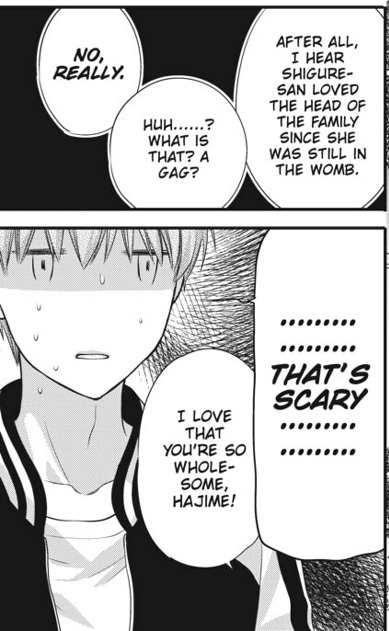
When the older Zodiac had the dream of Shigure, Shigure is the only one who made the active choice to seek out that feeling. His soul was touched, and he decided that he wanted that and only that. This doesn’t necessarily mean he went full Jacob from Breaking Dawn, but it does mean he acknowledged there was a bond, and he wanted it.
When you get into the technicalities of the curse, it’s mentioned that their Zodiac spirits influence how they interact with Akito, and that going against her can cause physical and emotional pain. Yuki cries when meeting her, and it’s mentioned that that’s just the normal reaction for the Zodiacs.
It’s hard to say how much of their early interactions are influenced by the curse, but it’s obvious that Shigure has genuine fondness for her. She wasn’t always absolutely broken, as shown in Yuki’s backstory, and was a precocious child, one who sought affection openly.
Shigure has an indulgent personality, and is shown to love being adored. Guess who loves him! Akito! Guess who wants lots and lots of affection! Akito!
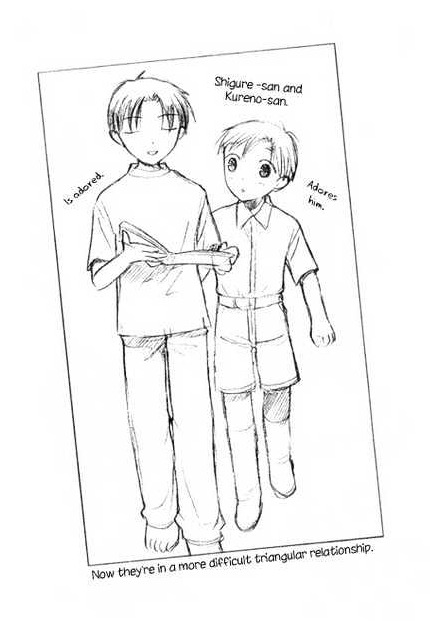
Their personalities are very well matched as they get older: They’re both intelligent and coy. They both have fairly sharp tongues when needed, and have no qualms about doing whatever it takes to get what they want.
Shigure wants Akito to be independent from the curse. He’s made it clear to her he doesn’t want to be her father, he doesn’t want to be her friend, he wants to be her lover. Those are boundaries that Akito’s never been given before, and his frankness with her and his jealousy with Kureno is something she agonizes over, simply because she’s never been given any sort of serious interpersonal boundaries, or repercussions for her actions. He’s always kept himself separate from her, because of those boundaries, even when they were children.
That’s important. It opens the door to the idea that her actions have consequences, and is a persistent nagging in the back of her mind.
“Even though you hadn’t realized it, I was waiting for that day.” (ch 101)
For the bulk of the series, the only person who sees Akito as a person separate from the curse, and sees a future where she can grow is Akito. He has an extraordinary amount of patience for her, and forgives her for a lot.
There are only two incidents that Shigure cannot forgive: Her sleeping with Kureno, and at the very end of the series, I’m of the full opinion that if Akito had pushed Tohru off the cliff, Shigure would have been done with her. Look at that expression, that is the look of someone who is toeing the line of throwing away all his hopes and dreams. If she really had pushed Tohru, I just...... The series would have taken a much darker tone.
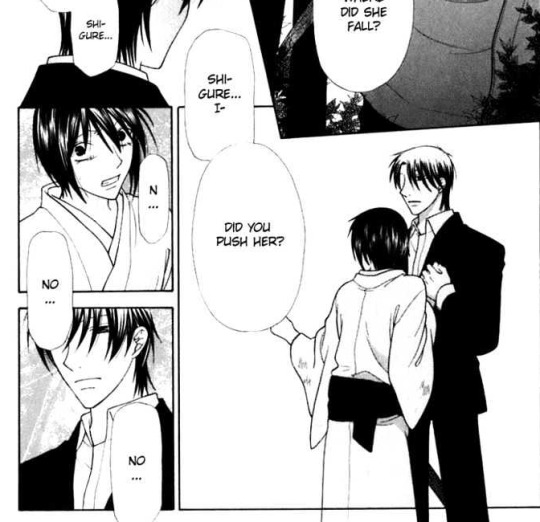
OKAY that’s enough about our favorite terrible author! (Okay, an aside, Shigure, please share your work ethic, you goof off so much but you’ve published so many things…how…)
ONTO AKITO!
“I’ve finally realized… she hated her own shallowness all this time, from the very start.” // “It’s frightening because you have no choices.” (ch 121)
A lot of people dislike Akito because she, for the bulk of the manga, is violent, manipulative and just downright unpleasant. And that’s fine, but it’s not the point of her arc or the themes of the manga. (It is, however, the point of Rin’s: you don’t have to forgive everyone.)
She’s not the only violent person in the series. If we as readers can forgive Uo-chan and Kyoko, or even Hana-chan for her moment of violence, why can we not extend the same grace to Akito?
Violence is often shown as a knee-jerk reaction to fear and sadness: Kyoko, Uo, Hana, Kyo, Rin, and Akito all react violently to negative situations and feelings. Even Kisa reacts violently when she’s at her worst, biting both Haru and Tohru when she’s in her tiger form, which is shown to actually cause pain like a real tiger would. (It’s played for laughs, but has anyone been bitten for realsies by a house cat? That hurts! How much more would a house-cat sized tiger hurt!!!)
Out of all of them, Hanajima and Kisa are the only characters to show immediate remorse, because they have what the others don’t: A positive support system. Once positive role models and support systems are in place, all of the others begin to learn how to react differently and ease out of the knee-jerk reactions that were ingrained in them.
It’s made explicit in the manga that you have to be taught how to react positively, you have to learn and choose to be good, to be friendly, to love yourself outside of others’ perceptions of yourself. Look at Yuki’s arc. Look at Uo-chan’s. Kyoko’s.
Yuki sums it up nicely in the last chapter of the manga, where he tells Tohru that she taught the Zodiac how to become human. She allows them to grow into people who can make the choice to be loving, compassionate individuals.
Just because Akito doesn’t interact positively with Tohru for the bulk of the manga, it doesn’t make it any less true:
Akito is kept in a juvenile state of being: No one teaches her to suck it up, that the world exists outside of herself, that other people are people and not things. In fact, she’s actively encouraged to act the way she does. She’s incredibly broken, between the maids of the Sohma estate just… allowing her to do whatever the fuck she wants and her absolutely jacked up relationship with Ren and Akira. She has no moral compass at all. No one bothers to teach her that her actions have serious consequences.
She knows, in a roundabout way that hey, these people don’t like me. There’s a serious mental dissonance between what she latently knows—these are all people with no connection to her other than the bond of the curse. This is why Tohru is able to break through to her at the climax of the manga:
She knows she’s wrong, but no one has ever told her she’s wrong but understood why she’s doing it. Akito just didn’t have the words to explain herself. What do children do when they cannot communicate? They lash out. Kids will bite, scratch, yell, kick, fall to the floor and have screaming tantrums out of frustration. Eventually, most kids learn that there are other ways to express frustration, and move along. (Not all, though, but most.)
Akito was taught that this is acceptable, allowable, and is her right as god. She is actively broken and kept that way through the neglect of the Sohma family maids, Ren’s abuse, and how Akira framed her role in the Zodiac.
I can go on and on and on and on why the way Akito was treated for her role in the Zodiac by her parents and the rest of the Sohma estate was just awful. I hate it, it’s terrible, she never had a chance to learn and grow and be the genuinely thoughtful woman we know she grows into.
She doesn’t force her path of forgiveness onto others and is fully cognizant of what she did, the repercussions of her actions, and lives her entire life after the curse breaks trying to right what she did wrong.
“Even if she gets hurt, she says she deserves it. She tells me not to let it bother me, but… I’ve always, always loved her so much.” (Another, ch. 13)
Tohru opens the door for Akito. She extends her hand, offers her friendship despite having seen the absolute worst of Akito. She tells Akito that everyone is lonely, everyone wants bonds, and acknowledges Akito’s worst fears, that Akito herself is selfish and dirty for wanting something assured and unending because she, Tohru, herself is dirty and selfish. Tohru knows what Akito has done, knows she’s injured some of her beloved friends, had plans to lock up Kyo, hurt Hatori.
Tohru still forgives her. One of Tohru’s striking traits in the manga is that she is suffering, every day, she struggles with the grief of losing her mother and the fear of being alone in the world. Through nothing but her own empathy and realization that loneliness is universal, she’s able to forgive people. She forgives Akito and cares for her, and through Tohru, Akito is introduced to the realization that she’s been wrong and that maybe, she shouldn’t be forgiven.
Shigure also forgives her, and this is the crux of their ship.
To me, that itself is wildly important.
They’ve always circled around each other, and Shigure has always been waiting for Akito to be able to come to him again, in full control of her life and choices. He wants Akito the woman, not Akito the god.
He’s been waiting for the day Akito can meet him as an equal. Akito wants it too, and has wanted him to turn and see her for a very very long time. But she’s been terrified, the entire time, that when he does see her as herself, Shigure won’t like what he sees, and will leave. She’s aware of what she’s done post-curse, she’s aware of the impacts it will have on the former Zodiac members, and she’s aware that once the “bonds” of god and the animals is gone, there may not be anyone left for her.
Neither of them are under any illusions at the end of the series: Akito knows she has to atone for what she did, Shigure knows she has to learn to grow into a person who can function alone. They both know that there are people who are against them changing the oppressive structure of the Sohma family.
Neither of them care. There are things that they want, together, and it’s enough. There’s a whole new world for them to explore and learn about. And in Furubana, this is shown to be a lifelong effort on their parts:
“She said after meeting me, she learned so many things for the first time. She smiled happily as she said it.” (Another, #13)
To close, I’d like to take a moment to talk about the curse and Shigure, and how he set things in motion.
Without Shigure, the curse would have devolved on its own, yes, but the circumstances would not have allowed for the freedom the Zodiac had at the end of the manga. It would not have ended with Akito being able to learn and live freely. Allowing Tohru into the Sohma family cracked open a door to compassion and kindness none of them had ever experienced before, because the Sohma family seems to exist in a vacuum of stability and love.
It wasn’t that Shigure knew instantly that Tohru was kind and loving and thoughtful, if anything, his read on her was “completely normal, albeit strange, teenage girl who obviously has a rough life”. But she was normal, she was from outside the Sohmas, and he knew that was enough. No one in the family was stepping up to change the status quo and how stifling and abusive it was, so he did it himself.
He did it because he loved Akito.
Not because he felt bad for himself, or Hatori, or any of the others, but merely because he loved her to the point of manipulation. It backfired in his face, because he got a big ol’ dose of “loving and respecting” juice from Tohru, but he still got the end he wanted.
What I mean to say is best summarized in chapter 123:
“It would be nice to live in a kind world, without any troubles, without any fear, without hurting anybody, without ever being hurt, only doing the right thing. I wish I could reach this kind world by the shortest path possible. … “That’s wrong”, or “that’s stupid”: If it’s someone else’s life it’s so easy to make such irresponsible comments. ...It would be great, but it doesn’t exist. … Little by little, walking one step at a time, is all you can do.”
We get to experience the roughest part of the path with Akito and Shigure, we got to watch them be terrible people who were lonely and in want of love struggle and learn how to get up and move on.
They tease each other, Shigure is thoughtful of the distinction between “the person Akito was raised to be” and “the person who Akito is”. He’s seen her at her messiest, and she’s seen him at his most jealous. They still chose each other, despite the hurt they caused each other, and others. They make up for it, reflect, and live a life that demonstrates that they have learned. They have friends who are thoughtful and loving and would not hesitate to drop everything and help them, lend an ear when they’re frustrated, help them not to make the same mistakes.
And then we get to see them be wonderful, kind, thoughtful, loving parents in Furubana.
We got to see their adorable, kind, compassionate child be friends with the children of the people Akito hurt, because everyone in the former Zodiac’s family collectively decided “never again, no”.
Their child adores them. Shiki in Furubana #13 radiates love for Akito and Shigure the same way Mutsuki and Hajime do.
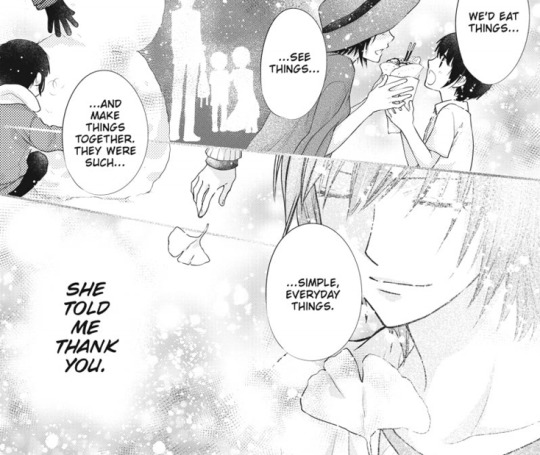
They are genuinely good parents, even when they tease Shiki, and I think that is testament for how good they are for each other and how much they’ve changed as adults.
I think that’s enough of a reason to ship them, don’t you?
#Mitkun writes stuff#fruits basket manga spoilers#fruits basket another#fruits basket spoilers#akigure#fruits basket akito#fruits basket shigure
66 notes
·
View notes
Text
Yoongi x fem!reader pt4
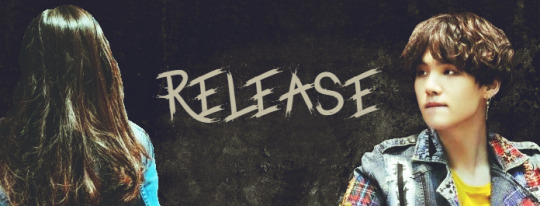
genre: hurt/comfort/smut
rating: E
word count: 4,5k
summary: In this series, Yoongi and you are childhood friends, and he’s helping you through some issues you’ve been facing lately, while your relationship slowly blossoms into something more.
warnings: implied depression, self-critical thoughts, EXPLICIT SMUT (oral sex) in the later part of this chap. Start and finish are indicated
Can be read standalone, but is part of a chaptered series
Part I: Catalyze
Part II: Flicker
Part III: Rise
“...and yeah, that’s...why I haven’t been keeping up with my schoolwork.”
You finished the sentence with a timid glance at the curly-haired woman on the other side of the desk. Her hands were knitted on top of the table, one of her eyebrows slightly arched. You understood why. Answering the question “so what seems to be the issue here, Miss Y/LN ?” hadn’t been easy, and you were pretty sure it hadn’t made sense, either.
Basically, you had just stuttered some disjointed, vague gibberish about "feeling a little under the weather lately". Aka, nowhere close to the truth. And now, the anxiety was making itself known. In the form of beads of moisture running down your neck, and your hands fidgeting in your lap.
Because you didn’t want to be here. In fact you wanted to be anywhere but here.
But once again, Yoongi had showed himself perfectly able to push you into motion and help get you back on track. Using his steady, encouraging flow of reassurances, and fingers laced into yours as he pulled you with him to your final destination. And now you were here. Squirming uncomfortably in a chair in the university counselors office, and discussing why you had fallen behind on your studies, all entirely against your will if you were honest.
Your eyes wandered over the neat rows of folders on white shelves, the piles of documents on her desk, the sterile academic environment. Run, is what your brain told you. Just get up, walk out, escape this situation – but Yoongi’s hand, inconspicuously resting on your thigh, prevented it.
Because he’d insisted on coming with. And now he sat next to you, like a parent there to discuss his child’s progression. Clad in his usual uniform, black hoodie and snapback pulled far over his forehead, all in order to avoid being recognized. It worked, and you alone had the counselors undivided attention.
“So, if I understand correctly,” she started, pushing her half-moon glasses further up her nose. “You’ve been...feeling ill? That's why you’ve been absent?”
"Uhm...kind of..."
“I see here that you have a lot of overdue assignments...and you haven't attended classes...but it would be best if you book an appointment with the university healthcare, if you have a condition that interferes with your ability to study.”
Your ears heated up as you digested this information. A tiny, sober voice within you told you yes. Do it, open mouth, voice the issue. Another, more overpowering and toxic one told you no. Repeatedly, until it was basically chanting it like a whole firing squad in your brain.
“No, no, I don’t need to. I...uh, I’ll make sure to finish all the assignments, ma'am. Just been feeling a little...unwell, but, yeah. I’m fine.”
You ignored Yoongi’s pointed glare, along with his attempts to kick you in the shin under the desk. Your counselor expressed clear puzzlement over the sudden change in your narrative.
“Oh? But didn’t you say that you’ve been feeling down and experiencing difficulty with keeping up with your studies?”
“Uh...yeah but, it was just a temporary slump,” you lied, and accompanied it with the most convincing smile you could conjure. “I really am fine, and I will catch up on it. Promise.”
“Miss Y/LN...I really do think you should go see the healthcare unit.”
“No need, I’m fine, I’m absolutely –”
“She’s depressed.”
The sharp exclamation draped itself over the three of you, and the office fell silent. You slowly turned to your left, quiet anger flaring in your gut. And Yoongi, the bastard, was wearing a polite smile and blatantly ignoring your burning looks.
The perplexed-looking lady opposite you blinked about a million times in confusion, before clearing her throat.
“Is what your friend is saying true, Miss Y/LN? You've been feeling depressed?”
Your airways were blocked, by what felt like a thick bundle of dry cotton. You didn't get a word out. Yoongi decided to just nod in affirmation on your behalf.
"Yeah, yes, she’s...been down. Not left her apartment much and just slept and not eaten and...I think she needs to see someone.”
“Oh, oh dear...well, that sounds worrying indeed." The lady turned to you with a motherly smile. "I’ll book you an appointment to the healthcare center, Miss Y/LN. They can refer you to a mental health professional if there's a need for that...hold on a moment...”
She started tapping something on her computer, while she kept talking, but you didn’t focus on it much. You were forced to just listen and accept the documents shoved into your hands, with the appointment date and other information. Forced to nod affirmatively when she announced it would be next week.
Not like you were about to go. No way.
Once you were dismissed, you were fuming. You stormed out and over the university grounds, leaving Yoongi and the repeated stream of requests to slow down behind you.
“Y/N, fucking wait – jesus, can you wait!?"
He finally caught you, but you ripped your arm from his grip instantly, backing further away while spitting furious words in his face.
“No, I can’t! Why the hell did you have to tell her that, Yoongi?! You had no right to tell her I’m…”
You came to a screeching halt just as you were about to say it, and gathered yourself. Yoongi regarded you from a distance, his eyes like dark, tranquil oceans as usual.
Always so understanding, always compassionate. Even now when you wanted none of it.
“I’m not depressed. Everything is fine with me.”
You said it with steadfast conviction. Maybe, if you said it enough times, it would become true.
The wind rustled the leaves in the trees around you. It was actually a beautiful day. The warm rays of sunshine heated your back up, and Yoongi’s sympathetic smile was securely in place as always.
“Y/N...I had to. If you get to decide yourself you just dodge your issues and pretend they don't exist for all eternity. I can’t just stand by and witness it anymore, okay? Please just trust me. Everything isn’t fine with you.”
“Yeah it is,” you interjected stubbornly. You shook your head, shook it until nausea hit you and you just stumbled uselessly when trying to vocalize what you felt.
“It is, and I don’t want to go...it makes me feel sick. I don’t want to talk about it...I don’t want to be the person who has something wrong with them, Yoongi...I want to be normal.”
Your voice was suddenly saturated with hysteria and tears, and Yoongi was on you in an instant. Picking you up, just like he always did, collecting the pieces and patching you up again. You sobbed into his hoodie, and asked him, over and over again, why it was so hard.
“It’ll get easier,” Yoongi promised. He hugged you as you cried, while a warm breeze blew past and gently ruffled your hair and dried your cheeks. “It will. But not until you face it, hun.”
During the next few days, you spent a lot of time hunched over your laptop. Slogging your way through email after email, and doing your best to figure out exactly how far behind you were in your studies.
Really damn far turned out to be the answer.
You did his best to fix that, finishing up half-written essays and projects collecting dust on your hard drive until you were close to crying from the effort. All of this happened while Yoongi sat next to you, peering over your shoulder and making sure the process was moving forward. But it left you exhausted, and the list of assignments was mile-long.
“I’ll never have energy to finish all this...might as well drop out,” you whined, face buried in your hands, multiple times when it all felt too overwhelming. But Yoongi wasn't about to just accept that. Of course he wasn't.
“Nope, you sure as hell won’t,” was his stern reply to that. He was like an impenetrable wall you couldn't bulldoze your way through, and so you remained in front of the laptop, while his hawk eyes made sure your attention stayed on the screen.
Annoying. It was, but you had to admit it was effective. After many cups of espresso and bordering-on-meltdowns the list gradually shortened, and you were left slightly less stressed. But you’d transformed into a wet rag at the end of it, a wet rag that Yoongi transported to the couch and kissed and hugged and showered with compliments about how you were doing so well.
And it felt good, admittedly. Even though he must be lying through his teeth. His arms wrapped around you also felt great, and his gentle kisses made you all tingly – but that was the problem. He was too gentle. Too soft, like you were some kind of fragile flower to be handled with care.
Yet another week had passed since your almost-steamy-encounter on Yoongi’s couch. Another week’s worth of wet daydreams, of imagining the two of you in scenarios that stretched so much further than just kissing. Another week’s worth of not daring to make the first move.
Because without alcohol flowing through you, you remained much too shy and insecure, even though he was your boyfriend now.
The desire you felt for him made your blood pump faster, made your lower regions heat up. Every time Yoongi held you, every time he sat next to you with his elbows leaning on the table. Because you just wanted so badly for those veiny hands to undress you. To wrap around you. To travel further down and envelop you, all of you.
But at the same time, you were scared when imagining it.
Maybe Yoongi’s vision of you wouldn’t match the reality, the you hidden underneath the oversized sweaters and baggy sweatpants you’d worn for the past week. Maybe he would just see what you saw in the mirror.
Someone a little too gray and washed out, who didn’t get nearly enough sun and who lacked that rosy, healthy glow on their cheeks.
Maybe Yoongi’s feelings would even cool once he saw your body. Despite all the things he’d said for the past weeks about how you were gorgeous and beautiful and perfect.
The thought brought you close to tears.
You just felt like an illusion, about to crumble anytime now.
All of this messed things up, and soon you found yourself in bed. At 5PM on a Saturday evening. And all of Yoongi’s messages sat in your phone, unread and ignored since a good 24 hours.
You were pushing him away again, and it was just a matter of time until the doorbell would ring.
It did, like an ominous church bell ordering you to return to the land of the living. And you dragged yourself over the same damn floor, towards the same damn door, mentally preparing for yet another lecture by the same person you’d let down, again.
“Hey there, bun,” Yoongi greeted casually, leaning against the wall in the corridor when the door slid open. “What’s up? Ignoring my messages again?”
“Yes,” you confirmed dully. Unnecessary to pretend otherwise, and you were aware how wantonly snappy you sounded. Yoongi took absolutely zero notice of it. He looked stunning as ever, the dark hair slightly tousled by the wind and hands shoved into the pockets of his jeans.
Hands that still hadn’t touched you where you wanted them to and when would they?
You slammed the door with unnecessary force after Yoongi strode past you, causing him to turn around in surprise.
“Woah? Easy with that. Bad mood huh? Look kinda rough.”
“Yeah. I always look kinda rough, if you haven't noticed.”
“Hold it right there. Don’t twist it into something it’s not. I just meant you look a little tired.”
He gave you a sharp glance, a warning that clearly told you "don't even try to argue". You yielded, heaving unhappily.
“I’m sorry. I just...I wasn’t feeling well, and everything just felt shit, and...I couldn’t get out of it”
“Uhuh...that’s...kinda why you need some help, sweetie.”
“I don’t need help.”
You tried, but it was weak at this point. Yoongi closed in on you, raising a hand to cradle your cheek and sneaking the other one around the small of your back.
“Sorry to slap you with uncomfortable truths, but...yeah, you do. And I understand that your mood shifts and you want to be alone sometimes...but please don’t ignore my texts. You're making me sick with worry when you don't answer. Okay?”
“Okay.”
“Alright, baby. So did you shower today?”
“No.”
“Eat?”
“No.”
“Y/N...that’s no good." He trapped you in a kiss, before separating you and giving you another look that left no room for arguing. "Come on. Go get showered or changed and whatever you need and let’s head to the shop.”
You huffed, turned and stomped off to your bedroom without a word.
Getting changed and going outdoors didn’t feel tempting at all. You dug through your closet, but once again there was nothing of use, because once again you'd failed to do the laundry. Because you’d been nestled in bed instead. And crawling into it again felt like a splendid idea now.
"How's it going over here?"
Yoongi had made an appearance in the doorway. He raised a critical eyebrow, skeptically eyeing the pajama shorts and coffee-stained t-shirt you were still wearing. You just stared blankly ahead, cross legged on the bed and not about to move another inch if you could avoid it.
"Badly. Have nothing to wear and I'm hideous."
You knew how that sounded, oh you knew. But you could do absolutely zilch to prevent it. Yoongi closed the distance between you, his gaze oddly dark, like a looming thunderstorm.
"Stop saying those things about yourself."
You bounced up, gurgling with unidentified frustration you just couldn’t seem to kick.
"No. Because it's true."
“It's really not. I understand it feels true to you. But you���re stuck with these ideas about yourself, because you’re seeing everything through a skewed lens. That makes you overly critical of yourself. Understand, baby?”
“Nope. You’re fucking wrong.”
Yoongi's finger on your mouth silenced you. He was right in front of you now, and he leaned in until his lips brushed over your ear.
"You're not hideous. Get that through your thick skull."
And then he pulled back, and kissed you. And it wasn't gentle. In fact it was everything but gentle. It was demanding, his tongue finding its way into your mouth and his fingers weaving themselves into your hair and his nails scraping over your scalp.
When you finally parted, your body was already in overdrive, your pulse crashing through your veins and your lower regions practically on fire and thumping almost painfully.
"Think it's about time I touched you, huh,” Yoongi pondered, eyes half-lidded and with his finger pressed down on your lower lip.
You just swallowed, whining something that sounded like "uhuh" in response. Yoongi's hands were all over you in an instant. He swung you around with your back facing him, and moved your hair out of the way so he could press feather light kisses down the junction of your neck. You were lost, to the unexpected shivers worming all over your skin, lost until you heard a request that made your knees weak.
"Is it okay if I take off your clothes?"
"Ye– yeah," you managed, without really thinking. There was just a split second of self-consciousness, and then your shirt was pulled over your head, your shorts hiked down – and you were bare, save for your underwear. You went rigid for a second, shielding yourself, but Yoongi untangled you quickly.
"Nah, none of that. Don’t do that. Let me see you."
He looped his own arms around your waist, and sprinkled kisses all over your exposed skin – your shoulders, your jawline, everywhere he could reach. And then, he spun both of you around. Facing the full length mirror, the one you’d been about to throw out so many times now.
"Look at yourself."
You looked. And looked away the next second. You saw yourself, the body you hadn’t studied for a while. You saw your skin illuminated by the lamplight, showing every little imperfection in unforgiving technicolor. And you saw Yoongi's toned arms blanketing you.
"Yeah, I'm looking. What's there to see? I'm, just...whatever. Just...meh."
"No. Not meh. Everything but meh. Stubborn, a little bratty, but definitely not meh."
He forked fingers into your hair, yanking you back to stress the fact.
"Or ugly. Or useless Or anything negative you want to imagine. I know you don’t see it yourself, but trust me, then. Can you do that?"
“Maybe.”
^^^^^^^^
You couldn’t, still – but you were coming undone, basically unable to speak, unable to do anything but succumb to Yoongi's voice and touch and tongue leaving goosebumps all over your skin.
Your breaths picked up as he unhooked your bra, sliding it off and throwing it to the side. You let out a pitchy whimper and dropped your gaze as he cupped your breasts. One by one, gently caressing them and rolling the pink buds between his fingers.
“Beautiful. Beautiful and mine,” he whispered into your hair.
He kept one hand loosely around your throat, while the other traveled down your spine – down, down down and all the way down. There, he gathered one of your asscheeks into his hand, squeezing possessively and pressing his own, very blatant boner against your ass.
“This too,” he purred cheekily, a little louder, and slapped it once, very lightly.
And you choked.
Well, nearly. Choked on the feeling of the pulsating, warm and very real body pushed up against you. It infused you with a craving that practically hurt, and you gasped in surprise when Yoongi’s hand snaked its way to your front, sliding down to part your thighs. He nibbled on your neck, while his fingers found your clit, lightly brushing over it and drawing moan after bated moan from you.
"You're hot, okay. I love your face, I love your body, I love your personality, you’re gorgeous and don't ever doubt that." Yoongi murmured, while stroking you through your underwear and holding you steady with his free hand. "I've wanted to fuck you for ages."
Oh shit. Okay. All you could do was whimper needily in response. The sinful confessions into your ear made your head spin violently – and that voice. Surely couldn’t belong to Yoongi – it was too husky, just oozing dominance – but it did. It did and it seeped right into every corner of you, into every cell of your body all the way into your fingertips and not least, your crotch.
And you felt like you might suffocate from the pressure. From Yoongi's fingers rubbing teasing circles all over you, his breath hot and wet against the nape of your neck.
"I want to see you too,” you whined, wrenching yourself loose and pawing desperately at his t-shirt.
"Sure thing, baby.”
You held your breath while his clothes were discarded. Shirt, jeans, briefs, and then he stood there, stripped in front of you. Not just a smudgy almost-Yoongi in one of your vivid dreams, but the real Yoongi. With a heinous twinkle playing in his mischievous eyes, his posture self-assured and his dick half-hard and smooth and...actually a little menacingly thick in girth.
You swallowed down the nervously flapping butterflies, and stepped forward, tentatively running hands all down his pale chest and around his back and his ass and absolutely everywhere.
You’d imagined this man naked so many times. All throughout your adolescence, and now that it finally happened, it felt like some trippy dream.
"God, you’re fucking...beautiful, Yoongi.”
"Says you.”
He grabbed you, kissing you and pressing the two of you together, with his hands firmly on your ass. And you heated up to scorching temperatures, while your brain was filled with only one thought.
“I want you.”
“Want you too. But we’re taking it slow.”
You grumbled, but he just briefly let his finger travel into your mouth, and smirked in response when you sucked on it like it was a lollipop. Then, you were hauled up and lowered onto the bed on your back, and turned into a shivering, whimpering wreck of a person. Yoongi kissed you, pushing his tongue in to drag it over the roof of your mouth, and continuing down your torso, your chest, your tummy until you shivered pleasantly underneath him.
He mumbled little words of praise at you while he went, and your breath came out shorter and shorter the further down he traveled. Soon he had to tell you to remember to even breathe.
“Relax. You’re so pretty, been wanting you for so long.”
He parted your legs gently, wrapping his hand around your thigh and sucking teasing love bites into the sensitive skin until you were almost crying from the sensation.
“Want me to touch you, baby? Can I take these off?”
You curled your spine against the sheets, desperate for him to just do it already. “Yeah – yeah. Please.”
"Good. Cause I'm really dying to."
Your panties slid off, finally, and Yoongi crawled between your legs, blinking up at you, dark eyes clouded with lust and tousled bangs falling into his forehead. All of you was practically vibrating, filled with electricity sprouting underneath the tips of his fingers as he rested one hand on your tummy and settled the other one between your legs.
“Look at you...already so wet for me.” He spread you with a thumb, sliding it between your lips, and you whined in response. Not like he was wrong. You’d basically been soaking wet since that first kiss. “So pretty. I want to make you feel good, hun. Can I eat you out? Do you want that?”
You nodded frantically. You could feel your release literally around the corner, and whatever Yoongi was about to do to you would lure it out at record speed. He offered you one of his gummy grins, gripping your thighs with both hands for leverage and pushed his pink tongue out, dragging it all over your clit and making you cringe against the sheets.
“God – Yoongi, holy shit-”
“You taste good. Fucking sexy as hell.”
You didn’t care about restraining yourself anymore. You allowed yourself to moan unabashedly while he sucked on your clit, and tantalized you by pushing his tongue into you and pulling it out the next second.
You hadn't been touched for so long, you hadn't come for so long . An eternity. And now you watched, eyes feverish, as Yoongi turned you into a slobbering mess in minutes. Your orgasm was close, and Yoongi must have felt it, because he quickly pulled back, lips glistening and cheeks flushed.
Next you felt his fingers teasing your entrance, and he threw you a quick, questioning glance and asked, voice hushed and dripping with lust, if it was okay. You hurried to nod again, crying out when he pushed a finger into you, slowly gliding over your walls and filling you up, while his thumb rubbed against your clit. Settling on his knees, he threw one of your legs up and squeezed your thigh as he started finger-fucking you, slowly but surely.
You couldn’t help but wonder, amidst all the hazy pleasure, how the hell he was that skilled with his hands.
Probably because he was experienced. You knew he’d had kind-of-girlfriends, but maybe he'd even had multiple partners. That thought made you irrationally jealous, once again, and also worried you’d appear like a rookie in comparison.
But those thoughts were quickly washed away, for now, as Yoongi hit the spot again, and a pitchy whimper escaped you, echoing through the whole bedroom.
“You’re tight,” he hummed, gaze heavy on you. “How’s that? Feels good?”
“Y– yeah...feels great…”
Your neck cringed, your hands gripping the sheets as he picked up the pace, before adding a second finger. Soon he had two of them knuckle-deep in you, fucking you while working your clit while you squirmed against him to create even more friction. You watched him, his lustful dark eyes plastered on you, the veins in his arms tensing as he brought you closer and closer.
"Yoongi...I'm gonna...c-come...if you keep doing that–"
"Well that's the goal, right? You're moaning so prettily, turning me wild," Yoongi teased, leaning forward. He positioned himself half-laying on top of you, so he was able to reach your quivering lips while his fingers slid in and out of you.
He kissed you hungrily, and you could feel his cock poking you in the side. You glanced down. There it was, all stiff and veiny and fully erect and – damn.
Yoongi wanted to fuck you with that.
You pictured it, and then you were done for.
"Coming?"
"Uhuh..."
"Go on, baby girl.”
Well. That did it. You shuddered your way through your release, spasming against Yoongi’s fingers and crying out a lewd and elongated “fuck” as you came. You faintly heard Yoongi mumbling something as you rode it out, and then you collapsed into the mattress. Completely drained, and with your chest heaving and droplets of sweat running down your neck.
^^^^^^^^
Yoongi pressed a chaste kiss to your lips, and withdrew his hand. "You okay, pumpkin?"
You nodded wordlessly, slow waves of pleasure still rippling through you. Yoongi sneaked an arm around your shoulder, pulling you against himself and squeezing you tightly.
"See why I wanted to take it slow now? Yikes...you look like you just finished a marathon. Didn't take you very long.”
He nuzzled into your hair, and you weren’t even able to provide anything coherent in response yet. Soon he announced he was taking you to shower, and before you could protest you’d been scooped up and carried off, bridal-style.
The shower was turned on, and you were dazed when jostled into position underneath the spray of water. It splashed down between the two of you, heating you up as you rested your head against Yoongi’s chest, just enjoying the warmth and being so close to him for now.
He pushed strands of soaked hair out of your forehead, and propped you up more securely when you were in danger of sagging to the floor. "Are you alright, sweetness?”
“Yeah...sorry, it’s been a while since I, uh…was...touched...”
You quietened, bashfully pushing your nose against his chest again to avoid meeting his eyes. He gave a little chuckle, and ran his hands all over your back in reassuring circles.
“Yeah, I figured. That’s okay. Just take it easy, baby. I’ll take care of you, don't worry.”
Yoongi gathered you into his arms, and your throbbing muscles were soothed by the flow of hot water. But you also felt a rigid boner poking your thigh, still. Belonging to him.
You peeked down at it. It was a little intimidating, but you were also eager to return the favor. Even though your tummy turned into slush at the thought of doing something wrong.
You swallowed down a lump, and Yoongi noticed your hesitance.
“Y/N. Just relax.”
"You're still hard though, I can –"
"Yeah, duh, I'm hard,” Yoongi chuckled, and pressed a tender kiss to your lips to shut you up. “...cause that was hot,” he added, and your cheeks instantly turned tomato-red.
"But we got all the time in the world. I can wait. You're the most important, bun."
"Fine, ugh...okay."
You burrowed into his chest, letting out a soft moan when he squeezed some shampoo out and started massaging it into your scalp. Yep. You could definitely see yourself getting used to this.
#bts fanfic#bts smut#bts imagines#bts scenarios#bts fanfiction#yoongi x reader#yoongi x you#bts self insert#min yoongi#bts fluff#bts angst#bts romance#bts au#bts reader insert#yoongi scenarios#bts si#bts x reader
57 notes
·
View notes
Text
When I’m With You, I’m at Home- a Freezerburn Thesis

Table of Contents
Introduction
Tell Me Can A Heart Be Turned to Stone?
Any Remarkable Heart Has Gone Through the Hardship and Shame
Goldilocks and Snow White- The Freezerburn Dynamic
Snowflakes, Sunlight, and Songs- Symbolism Surrounding the Ship
Counterarguments and Refutations
Conclusion
Let’s get this show on the road.
1. Introduction
RWBY has had multiple attempts at diversity throughout the years, from the good, to the bad, and an entire spectrum in-between. Some of this involves LGBT+ couples, which are a favoured ship in the RWBY fandom. The most popular of these wlw ships are generally involving pairs between the main four girls, Ruby, Weiss, Blake, and Yang. In this thesis, I am going to discuss the characters of Weiss and Yang, the storytelling and development of their relationship, and why this ship is top-notch.
2. Tell Me Can A Heart Be Turned to Stone?
Weiss Schnee, first appearing in the White Trailer on February 13th, 2013, is the second character who appears in RWBY canon. In her trailer, Weiss’s main theme song, Mirror Mirror, characterises her as a lonely individual who fears that she has become so closed off from the world that she’ll never be able to make any connections or open up to others again.
Heiress of the Schnee Dust Company, Weiss is characterised as a prim, proper, snobby brat when we meet her in volume 1, her haughtiness getting her into spats with her teammate and partner Ruby, and eventually causing friction within the group when her racist and discriminatory attitudes collide with the rest of her team. While we don’t get a proper resolution in the form of actual apologies for her actions, this part of her characterisation is quickly dropped throughout the rest of the show and Weiss later becomes the main person to stand up to racist actions in the cast.
Weiss, from volume 2 onwards, is characterised as a defrosting Ice Queen, cold, proud, and thorny to everyone, but slowly warming up to her team. She proves herself to be loyal, brave, and compassionate to her teammates over the course of the rest of the show, consistently offering support and kindness where she can. She fits rather well as a support fighter within the group, consistently buffing her teammates with her semblance, and using her elemental dust for combat effect. She has consistently been a caring, supportive individual to her allies, despite her overarching motif of ‘loneliness’.
3. Any Remarkable Heart Has Gone Through the Hardship and Shame
Yang Xiao Long, first appearing in the Yellow Trailer on June 2nd, 2013, is the final member of the protagonist team to appear. Her debut song, I Burn, is all about her love of fighting, and her supreme self-confidence in her skills. What is interesting about the trailer version of I Burn is that it carries through the other songs from the rest of her team, depending on what stage of her battle she’s fighting.
The older sister to main character Ruby Rose, Yang doesn’t get much characterisation in volume 1 aside from being generally nice, supportive of her sister, and hints to some staggering anger issues and impulsive behaviour. This personality is in place throughout volume 2, where she gets more information given on her backstory and begins to show the flaws in her character, specifically how her abandonment issues from Raven drive her, her aimlessness of purpose scares her, and how her reckless temper puts her in more danger then she can handle.
Volume 3 puts Yang through a physical and emotional wringer, starting with being framed for attacking Mercury and ending with her desolate in her bed, having lost her right arm to Adam. The rest of the show attempts to tackle her storylines of depression, PTSD, disability in the form of amputations and prosthetics, the neglect and abandonment from her deadbeat mother, trauma surrounding Blake and Adam, and her anger issues. Despite it all, the core spark of Yang’s warmth is still available for her teammates, with her welcoming each of them with open arms when she reunites with them.
4. Goldilocks and Snow White- The Freezerburn Dynamic
Weiss and Yang have the healthiest friendship of the four main girls in team RWBY. They have excellent synergy when they work together, as implied first with their team move in Painting The Town, further fuelled with the two of them planning the Beacon Dance and having it go without a hitch, and confirmed when they go into the Vytal Doubles Round together. Weiss and Yang have complete trust in the other during combat, consistently protecting each other in a way no one else in team RWBY does. A good example of this is Weiss willingly throwing herself into a lava spout to protect Yang from an attack from Flynt. Even outside of fights they are always pushing the other to be their best. Eg. Yang confronting Weiss on her attitude towards Blake in volume 1 and Weiss supporting Yang throughout volume 5
While they don’t get as many scenes as some of the other bonds in the show, their rock-steady faith in each other is especially prominent after Yang kneecaps Mercury, with Weiss immediately declaring with full confidence ‘Yang would never do that’ and ‘Yang would never lie to us’ when Blake doubts Yang in the same scene. Yang, meanwhile, shows an incredible amount of emotional maturity after the Fall of Beacon when she recognises that Weiss did not choose to leave her side, having been forced to return to Atlas by Jacques.
When they reunite in the Branwen camp, they once again immediately have each other’s backs, with Weiss’s knight acting as a guard for their backs while they face off against Raven. Yang, despite her conflicted feelings towards Raven, instantly shows anger and horror at the fact that Raven kidnapped Weiss, showing how her bond with Weiss is much dearer to her. Weiss, once the danger has passed, throws her sword away without a shred of hesitation and bodily flings herself into Yang’s arms, hugging her close while proclaiming ‘I missed you so much’. Yang returns the hug, but not before looking stunned at Weiss’s actions, and returning the sentiment with ‘I missed you too’. In one of the more beautiful bits of animation in the show, Weiss’s knight fades out of existence behind them.
Throughout the talk with Raven, Weiss and Yang’s main roles are relegated to asking questions to allow for more exposition, but Weiss stands up for Yang quite a lot against Raven, specifically calling her obnoxious when Raven tries to start on a delaying tactic. Weiss also grounds Yang when Yang’s temper threatens to get the better of her, taking Yang’s hand and calming her down when Raven insults Taiyang to get a rise out of Yang. The two ride off on Bumblebee together, and when Yang reunites with Ruby, she shows no hesitation in inviting Weiss into the hug as well.
In Alone Together, we get Weiss and Yang talking in a scene where Weiss allows Yang to vent out a lot of her frustrations about Blake and her abandonment from family before she opens up about some of her own homelife, in an attempt at empathy about them both having experience with extreme loneliness. Weiss states ‘I don’t know loneliness like you do. I have my own kind’ and finishes the scene with ‘I’m here for you too’ to Yang, offering a measure of support that Yang has not been offered by anyone since she left Patch.
While Yang and Weiss don’t have much time together during the Haven fight, they are generally aware of each other, particularly when the other is in trouble. Yang’s expression when Weiss is impaled is horrified, meanwhile when Blake is standing in front of the rest of the team, Weiss’s eyes are on Yang to wait and see what Yang wants to do. It is only when Yang chooses to agree with Ruby that Weiss offers the hug to Blake, since she is aware of just how much Blake hurt Yang.
It is this trust and support that makes up the backbone of Freezerburn’s dynamic as a ship, with the two of them near-eternally supportive while also being willing to push the other to do better for themselves. Both with their own experiences of loneliness and with trauma, they also have never pushed their pain onto the other and have instead showed mutual communication, understanding, and warmth to each other.
5. Snowflakes, Sunlight, and Songs- Symbolism Surrounding the Ship
Freezerburn has a lot of good symbolism that is a shipper’s playground for the pair. From their first noticeable team-up being bookended with rainbows, to the very classic hot and cold dynamic that is very popular in a lot of important bonds in media. Yang saturates herself with fire imagery, to the point that it is the main tell of her semblance, and a recurring motif in most of her music. Weiss has the exact same saturation of her snow and ice motif, with her glyphs being snowflake-patterned. This provides a nice contrast both in and out of show for the two characters when it comes to their imagery.
Another, more subtle, piece of symbolism that threads through volumes 4, and 5, is Weiss’s knight being narratively tied to Yang. While one could make the argument that this started in volume 3, with Weiss first manifesting the Knight’s right arm in Heroes and Monsters, the same episode where Yang lost her own arm, that ties Yang’s traumatic experience into shipping fuel, which is a bad take and should not be done. Trauma is not romantic and holding up a disability and the event that caused it as the shining example of True Love is not a good argument for a ship.
Instead, we can talk about how Weiss first summoned her Knight in Two Steps Forward, Two Steps Back, where Yang also takes her ‘step forward’ so to speak, listening to her father’s advice for their next spar, and how tying the two events as the ‘Steps Forward’ also comes into play when they first reunite in Lighting the Fire. Throughout the beginning of volume 5, Weiss has been using her knight as her comfort, and it is only when she is hugging Yang that she allows her knight to disappear. While this symbolism is a thin thread, it is still worth mentioning as a connection that exists.
Speaking of the songs, Weiss and Yang between them have the most singular character songs in the RWBY soundtrack, each of them stringing together to tell stories. For Weiss, her songs start, retroactively, with Path to Isolation, flowing into Mirror Mirror, Mirror Mirror Part II, It’s my Turn, and finally ending with the masterpiece This Life Is Mine, where she lyrically discards the mirror motif that has been with her from the start. Yang, meanwhile, starts with I Burn, quickly followed by Gold to show her softer side, with her number of songs diminishing over the events of volumes 2 and 3, before it kicks back into force with the triumphant Armed and Ready, the anger-fuelled Ignite, and ending on the heartbroken All That Matters, where Yang ruminates on how much Blake has hurt her, and will likely hurt her again in the future.
These two ‘song stories’, so to speak, are both currently at a pause until we get any further Weiss and Yang solo songs, but considering how we left with Weiss on a high note in her character development, finally freeing herself from her father’s abuse and ready to take her life for herself, and Yang at a low point where she requires the support of someone who has not hurt her the way Blake did, it is an interesting contrast . I would also like to talk about the significance of Home playing over the Freezerburn reunion, as Home upholds the same values of endless support and safety that is a running theme throughout Freezerburn as a ship. Specifically, the lines ‘I had you through it all’ and ‘A haven of safety where I’ll dry your tears’ are very emblematic.
6. Counterarguments and Refutations
Now, the main argument that seems to exist against Freezerburn as a ship is, well, Bumbleby. Now, I don’t mean to attack Bumbleby, I am not trying to start a ship war, but I would like to point out that Bumbleby, currently as it is written from volume 4 onwards, is based around trauma bonding and lacks any of the trust or open communication that Freezerburn has. An example of this is the talk in the truck in volume 7 doesn’t have Blake and Yang discussing anything of importance and instead features them dancing around their issues until Yang goes along with what Blake wants. Another example is the main Bumbleby fight scene in volume 6, where Blake spends most of it offscreen climbing a wall, letting Yang take the brunt of the fighting, and doesn’t make any moves to truly protect Yang from her ex.
I would also like to state that Bumbleby, going into volume 8 this weekend, is not canon yet, and should not be taken as canon. If RWBY can confirm relationships with things like ‘this is my wife, Terra Cotta’, or with kiss scenes, then it can do the same for Bumbleby. And should Freezerburn become canon instead, then it is a good milestone for LGBT+ representation in media, as Freezerburn is also a wlw ship, and would not devalue the show’s attempts at inclusivity.
7. Conclusion
To finish things up, Freezerburn is a great ship. This ship is an overall positive development for Weiss and Yang, character-wise, as it brings out their best qualities rather then their worst qualities. Freezerburn has a healthy amount of trust, respect, and communication, never feeling like the other ‘owes’ them anything, and they are endlessly supportive in a variety of ways. It’s good, what else is there to say?
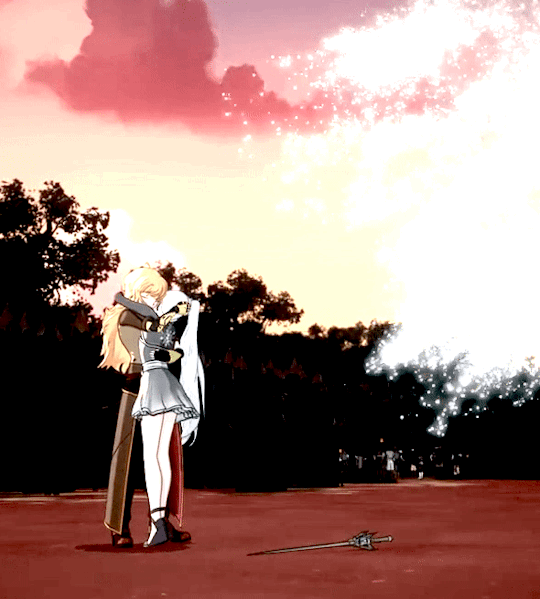
41 notes
·
View notes
Text
Quest RPG Adventure: The Realer of Two Worlds
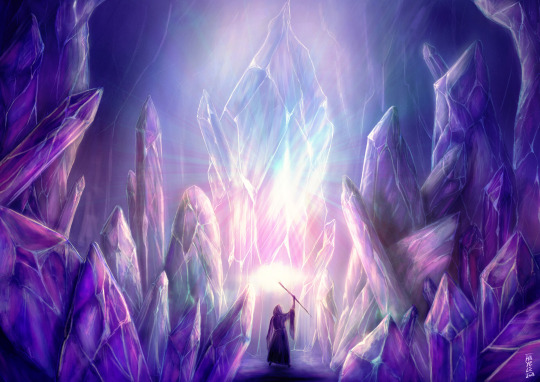
Premis/Setting
The Realer of Two Worlds Takes place in any mine within your own campaign. It can take place as part of a small town, city, or even Kingdom that is built near a mine as its main source of income and work. It can also be a great starting point for a campaign as long as all the Questers agree to be connected to the mine in some way and have stakes in its continued existence and the profits it provides.
Feel free to name the town and mine anything that fits into your campaign, but for this short module, we’ll call it Phos Mine, named for the Phos Crystals that grow within its depths.
Opening Scene
Start your Questers in the local tavern near the mine, called The Purple Swill. It’s the local watering hole for all the miners, where they all swap tales of cave-ins, things within the deeper shafts that go bump in the night, and other tall tales. For a mine, Phos Mine is a pretty safe job other than the fact that the Phos Crystals project a person’s fears, desires, or needs as phantasms for all to see if touched with bare skin.
As the Questers drink the Purple Swill brew that the tavern is named after, the door to the tavern creaks open and a little girl, no more than 10 years old stands in the doorway. She is dirty and disheveled and looks ill-cared for. She shuffles up to the bar and asks for something to eat, but has no Phos Crystal dust to pay for it. The bartender is a gruff and uncompromising half-ogre who has little empathy or sympathy (if any). He launches into a talk about how nothing in life is free and at some point everyone has to make their way in life as the little girl begins to sob. The half-ogre doesn’t understand humans well and will think the little girl is laughing, as he often forgets that tears are typically a sign of sadness. If someone reminds him of this he’ll launch into another talk about how ogres, and especially half-ogre sweat profusely when they are sad, and he’s never cried in his life because the ogre in him means he has no tear ducts. For all intents and purposes, his name is Chuk.
When the little girl begins to let out a long wailing, Chuk will offer anyone a night's worth of Swill if they get the little human out of the tavern and stop it from making that noise.
(Optional: If you want to toss in some added tension to the quest, introduce an NPC band of adventurers who want that night of free Swill for themselves. When Chuk offers it up, they will try to stake claim to the child and get her out of the tavern, though not to help her. If your Questers are trying to help her, they may run into some competition with this other adventuring party.)
Eemknot Seeintings
The little girl is Eemknot Seeintings, and her father is a well-known miner named Eeam Seeintings. One or more of your Questers might know him. Eeam is well-liked, but some months ago his wife, Eemknot’s mother passed away.
As Questers question Eemknot the little girl will tell them that 10 days ago her father went to work in the mine and never came home. She’s eaten all the food in the house and has only now left because she’s gone hungry for the last day or so.
If/when pressed for details about her father, Eemknot will tell Questers he has been very sad since Mom died. If asked if she’s seen him do anything strange or if has been acting differently, she won’t name anything specific until she gets some food. Once she has something to eat her mind can get off food and she’ll begin to remember bits of information about her father. First, Eemknot divulges that she has seen and overheard her father speaking to himself while at home. When asked further she’ll tell Questers about the purple dust he puts on his food. Phos dust is purple, and the Questers would know this. Lastly, Eemknot will remember that when her father left for work ten days ago, he took a large backpack with him,
Manager Gorbuck
The Phos Mine has many shafts and adjacent tunnels that end in dead ends. Workers are there 24 hours a day, so no matter what time Questers go to the mine there will be a manager in the small office at the entrance.
Manager Gorbuck is a hardy woman of callused hands, grubby cheeks, and a can-do attitude. She spent years down in the Phos Mine until she lost her left eye in a bizarre bowling accident at the local bowling alley. She now is a pencil pusher and time-card tracker at the mine. Despite this, she keeps an eye on pretty much everything going on around the mine, even if she doesn’t know what’s going on below the surface.
When Questers come to speak with her about Eeam, she’ll nod as though she already knows what they’re talking about. She’ll tell them the same thing Eemknot told them. That Eeam went into the mine ten days ago with a big backpack. Reports from other miners are that Eeam went down into the deepest tunnels where there aren’t any lights set up. Gorbuck will just tell the Questers that Eeam is down in one of the deep shafts by himself in the dark, and nobody has been able to get him to come out.
The Phos Mine
The Phos Mine is a busy place with rail cars and workers. If your Questers are miners, they’ll know how to get to the deep shafts, but they may want to stop along the way to ask workers if they’ve seen Eeam and to learn about why he’s in the deep shafts.
The Phos Mine looks like any other mine until Questers come to places that are actively being excavated. In the most active places, Phos Crystals as small as a thumbnail and as large as a head are being dug out of the ground. Every worker wears long sleeves and gloves to protect themselves from the phantasms that will spring from their minds if they touch a Phos Crystal with their bare skin.
If Questers touch a Phos Crystal to their bare skin, it is up to you how you want to handle the event. You can ask the player to describe what phantasm appears or, if you know the character's backstory well, you can use the event to drive some character-centered narrative.
Finding Eeam
Eeam is a chamber which the deepest shaft of the mine opens onto. There are no rail cars that take Questers down the low, and so they’ll have to walk, eventually. They’ll also need to take some form of light with them, whether by magical means or a torch.
Questers will hear Eeam sooner than they see him. His voice echoes in the large chamber he is in and floats up the deep shaft as Questers approach. It sounds as though he’s having a conversation, but as so often happens with echoes it’s difficult for Questers to know what he’s saying until they enter the chamber.
As their light floods the large cave-like chamber they will take in the following:
The chamber is wide and roughly curricular, perhaps 100 feet, give-or-take, in any direction from wall to wall. It has a tall ceiling as well. Near one side of the chamber is a small underground stream. Presumably, this is how Eeam has stayed alive without dying of thirst.
More startling, and perhaps what should be focused on, however, is the scene near the stream. Eeam is bustling around a kitchen that seems completely out of place in the chamber. At a small table is his daughter Eemknot and a woman that could only be his wife, and Eemknot’s mother, Daunt. Eeam is talking to his family, but when the family responds they their mouths move but no sound comes out. However, Eeam seems to understand them. What’s most startling is that wherever Eeam walks, a scene appears for all to see, and the scene behind him fades. It’s as though anywhere he goes a phantasm of his desire is manifested before him, creating a replica of the life he lived before his wife died.
The Solution
In my experience, the best Quest sessions are ones in which questions are posed to players without a clear idea of how they will achieve their goal. In this case, the goal will likely be to get Eeam to see the phantasms for what they are and return to his daughter. While he has chosen to live in a dream world, he will acknowledge Questers and try to make them feel at home as though they are visitors to his house.
There are a few options I can imagine Questers taking. First, they can try to discover the Phos dust Eeam uses on his food, and take it away from him. Second, they can just kidnap him and pull him out of the mine by force. Lastly, they can try to reason with him through clever roleplay and abilities. There are some skills that let Questers dissolve illusions. It’s up to you, the Guide, to decide if this will work on the phantasms. Since they are springing from Eeam himself, there could be a case made that magic won’t work on the phantasms themselves, but only on the person.
Note that if they try to force Eeam to leave his dream world made of self provoked phantasms, the trauma may drive him mad. Instead, it may take something more subtle in order for him to leave--perhaps even bringing the real Eemknot down into the chamber, in order to make Eeam see what he has done to his real daughter.
If Questers are unable to convince Eeam to return to the real world, they may have to find someone to take Eemknot in or adopt her themselves.
3 notes
·
View notes